The Garage Time Capsule
My name is Ellen, I'm 63, and for the first time in a long while, I thought I was finally ready to let go. It had been two years since my husband, Mark, passed away suddenly from a heart attack, and our garage was still full of his things—old tools, dusty fishing rods, and his pride and joy: a 1968 Mustang convertible. That car had been his baby, though to me, it was just taking up space and gathering cobwebs. Every time I opened the garage door, it felt like walking into a museum of what used to be. The smell of motor oil and leather polish still lingered, as if Mark had just been tinkering with the engine yesterday. My daughter, Lila, kept telling me to "declutter" and "move on"—easy for her to say when she wasn't the one who'd spent forty years building a life with someone. She'd send me those Marie Kondo articles and talk about how I needed to "make space for new memories." Maybe she was right. The garage had become a time capsule, preserving a life that no longer existed except in my memories. I'd stand there sometimes, keys in hand, wondering if selling the Mustang would feel like betraying him or finally setting myself free. What I never expected was that clearing out his beloved car would uncover something Mark had kept hidden from me all these years.
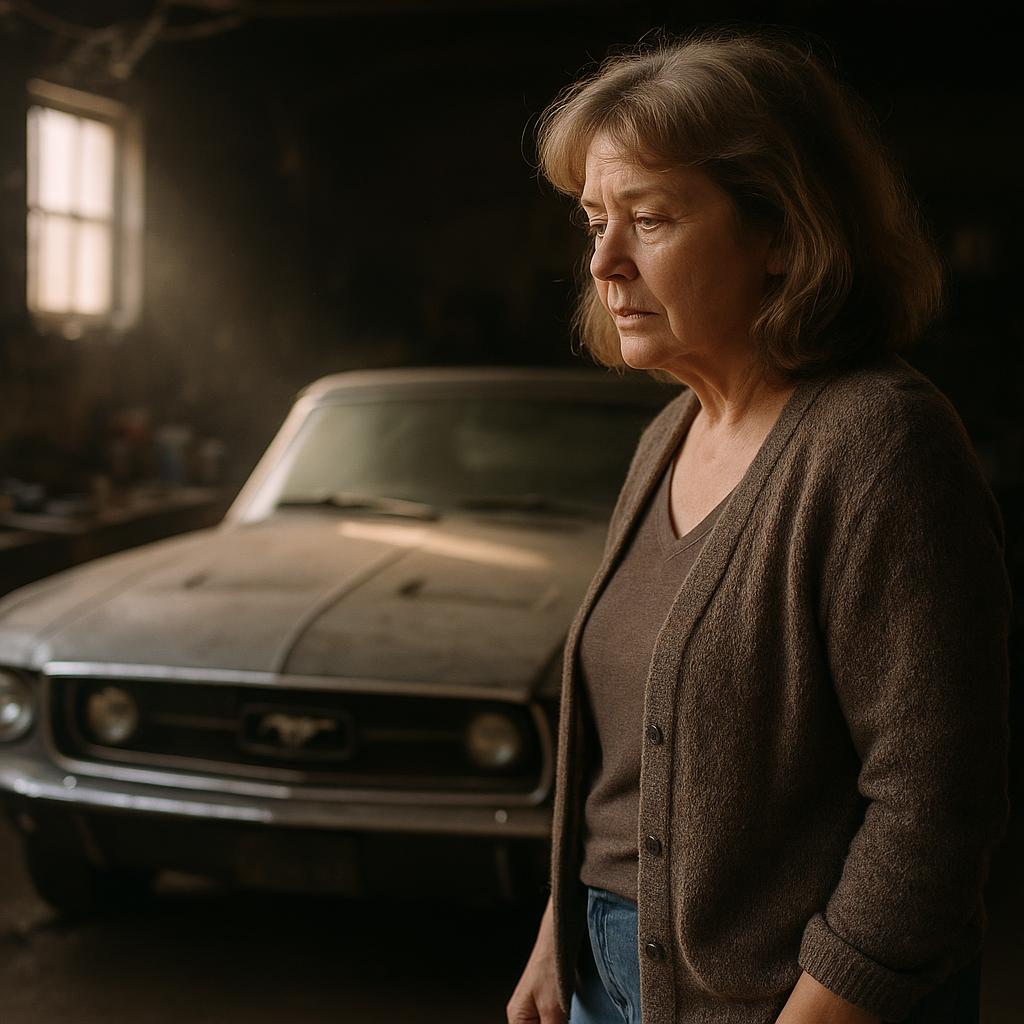 Image by RM AI
Image by RM AI
Lila's Decluttering Mission
Lila's decluttering mission intensified as my bank account dwindled. "Mom, you could list that Mustang for at least $30,000," she'd say, forwarding me links to car auction sites with annoying frequency. "That's a year of expenses right there!" I'd nod and change the subject, but the truth was, she had a point. My retirement fund wasn't stretching as far as I'd hoped, and the property taxes on our family home had nearly doubled in the last decade. Mark had always handled our finances—another thing I was learning to do without him. Last month, I'd sat at the kitchen table surrounded by bills, calculating how many more years I could stay in this house before being forced to downsize. The math wasn't pretty. The life insurance money had covered the funeral and medical bills, but not much else. Mark and I had always lived comfortably, not extravagantly, but now every unexpected expense felt like a crisis. The water heater had died last winter, and the $1,200 replacement had kept me awake for weeks. When Lila texted me yet another article titled "How Boomers Can Declutter Their Way to Financial Freedom," I finally replied: "Maybe you're right." What I didn't tell her was that letting go of Mark's things felt like losing him all over again. But sometimes survival means making choices that break your heart a little. I just never imagined that selling his car would lead me to discover that my husband of forty years had been keeping secrets.
 Image by RM AI
Image by RM AI
The Decision
So one sunny Saturday in April, I finally did it. I pulled the dusty car cover off the Mustang, revealing its faded cherry-red paint that still managed to gleam in the sunlight streaming through the garage windows. With shaky hands, I snapped photos from every angle, trying to capture what Mark had loved about it. I wrote a simple listing—"1968 Mustang Convertible, one owner, needs TLC"—and posted it online, half-hoping no one would respond. Within two hours, my phone was buzzing non-stop with notifications. Twelve interested buyers! One offered cash sight-unseen. Another wanted to know if I'd trade for a newer car plus cash. I sat at the kitchen table, staring at these messages from strangers who wanted a piece of Mark's life, and felt my throat tighten. Was I really ready to watch someone else drive away in his baby? Lila called right as I was considering deleting the listing altogether. "Mom! I saw you posted the car! I'm so proud of you," she gushed. I couldn't bring myself to tell her I was having second thoughts. "There's a guy who restores classics," I said instead, scrolling through the messages. "He seems... respectful." His name was Jacob, and unlike the others who asked about horsepower and transmission, he'd written: "These cars hold memories. I'd be honored to see it." Something about his message felt right. I replied to him first, arranging for him to come see the Mustang the following day. What I didn't know then was that this decision would unravel secrets Mark had kept buried for decades.
 Image by RM AI
Image by RM AI
The Car Lover
Jacob arrived the next morning in a weathered pickup truck with a trailer hitched to the back. He was mid-40s with salt-and-pepper hair and work-roughened hands that spoke of years spent under car hoods. The moment he laid eyes on the Mustang, I knew I'd made the right choice. "Oh my," he whispered, circling the car with reverence, running his fingers along the chrome trim like he was greeting an old friend. Unlike the other potential buyers who'd messaged me with questions about horsepower and market value, Jacob seemed to understand what this car meant. "These classics, they're more than just vehicles," he told me, his eyes crinkling at the corners. "They're time machines." As he checked under the hood, I found myself sharing stories about Mark—how he'd spend Sunday afternoons polishing the dashboard, how he'd named her Ruby. Jacob listened with genuine interest, nodding in all the right places. "I restore these beauties for a living," he explained. "Each one gets treated like family." When he offered a fair price without haggling, I felt a weight lift. The thought of Mark's pride and joy going to someone who'd cherish it brought unexpected comfort. But as Jacob slid into the driver's seat to test the engine, I felt a sudden pang of doubt. Was I really ready to watch this piece of Mark drive away forever?
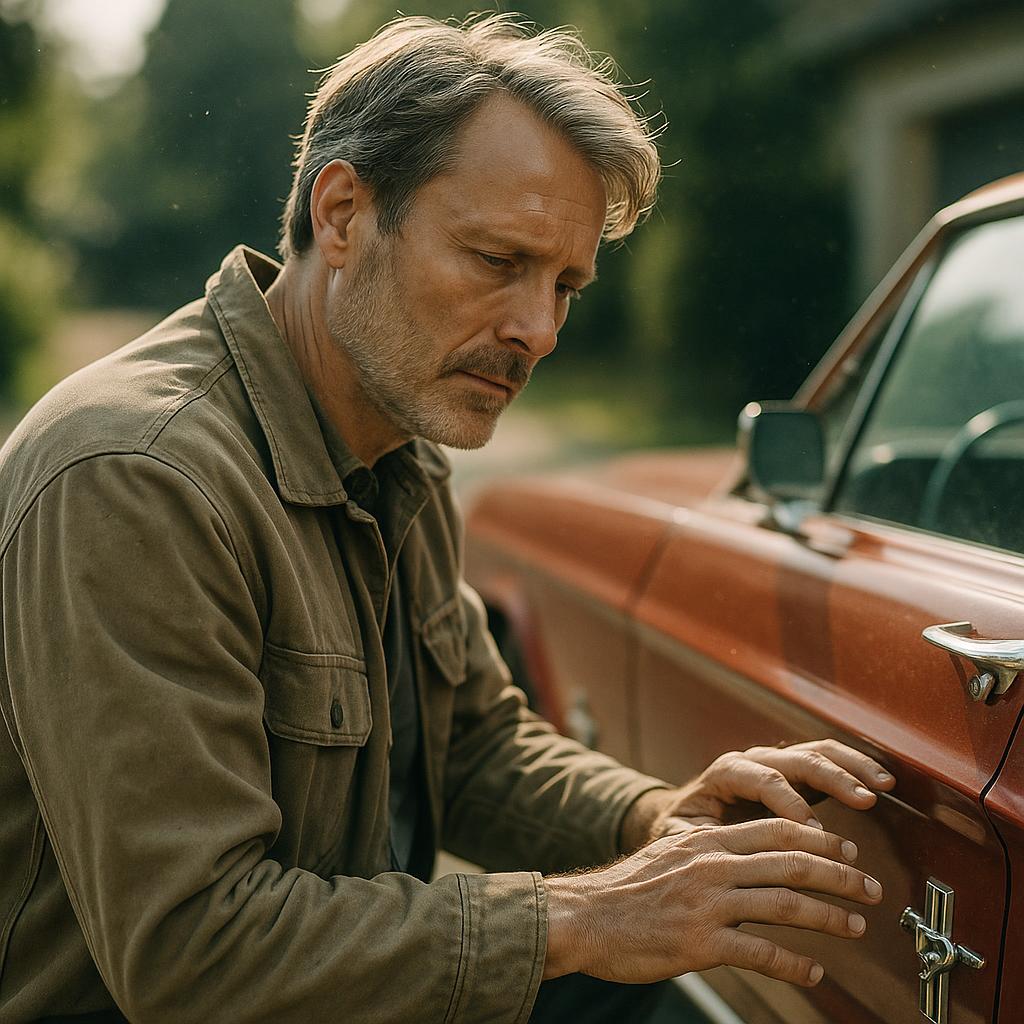 Image by RM AI
Image by RM AI
The Handover
The day of the handover arrived with a sky so blue it felt like the universe was putting on a show just for us. Jacob pulled into my driveway right on time, trailer in tow, ready to take Ruby home. I stood in the garage, keys clutched in my hand, suddenly feeling like I was giving away a family member. 'You sure you're ready?' Jacob asked gently, noticing my hesitation. I nodded, unable to trust my voice, and pressed the cold metal keys into his palm. Our fingers brushed, and I felt forty years of memories pass between us in that simple exchange. Jacob slid into the driver's seat with careful reverence, adjusted the mirrors, and turned the key. The engine roared to life with a rumble that had always made Mark smile like a teenager. 'Beautiful,' Jacob murmured, his face lighting up. 'She sounds perfect.' I watched him run his hands over the steering wheel, caressing the dashboard like he was greeting an old friend. The leather seats still held the impression of Mark's body, worn in all the places he'd sat for countless Sunday drives. Jacob opened the glove box to check for the registration papers I'd mentioned, and that's when everything changed. His expression shifted from admiration to confusion as he reached inside and pulled out something I'd never seen before – a small, yellowed envelope with my name written on it in Mark's unmistakable handwriting.
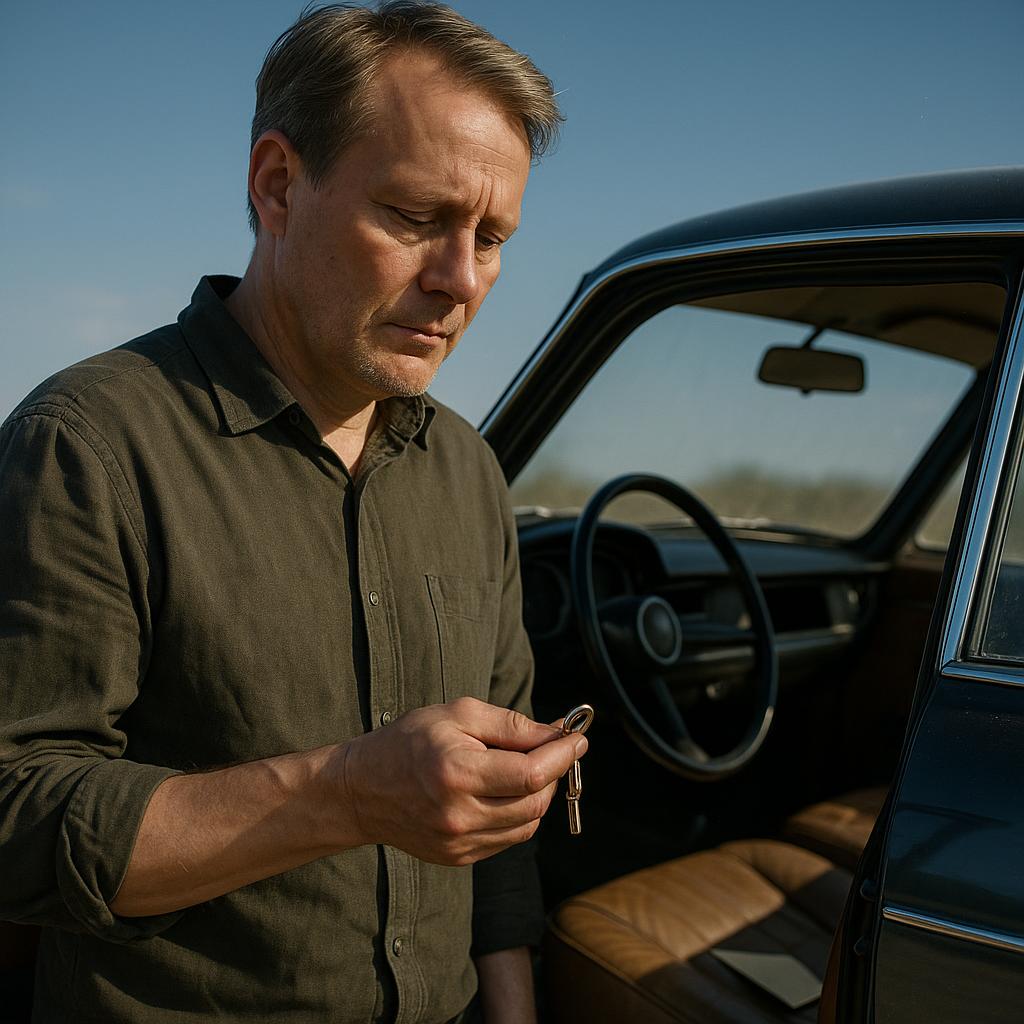 Image by RM AI
Image by RM AI
The Envelope
My hands trembled as Jacob handed me the envelope. The paper felt fragile, like it might disintegrate at my touch—yellowed at the edges and clearly hidden there for years. I'd cleaned that glove box dozens of times after Mark died, organizing registration papers and tossing old gas receipts. How had I missed this? 'I... I don't understand,' I stammered, turning the envelope over in my hands. My name was written in Mark's distinctive handwriting—the way he always made his capital E's with an extra flourish. Jacob shifted uncomfortably in the driver's seat, clearly caught between curiosity and wanting to give me privacy. 'Should I step outside?' he asked gently. I shook my head, unable to form words as I carefully broke the seal. The sound of tearing paper seemed unnaturally loud in the quiet garage. Inside was a folded piece of paper—and a small key that fell into my lap. My heart hammered against my ribs as I unfolded the note. The message was short, just one sentence in Mark's handwriting, but it made my blood run cold: 'Ellen, if you're reading this, it means you've finally let go of the car—and it's time you knew the truth.' I looked up at Jacob, who was trying his best not to stare. 'The truth?' I whispered, more to myself than to him. 'What truth?'
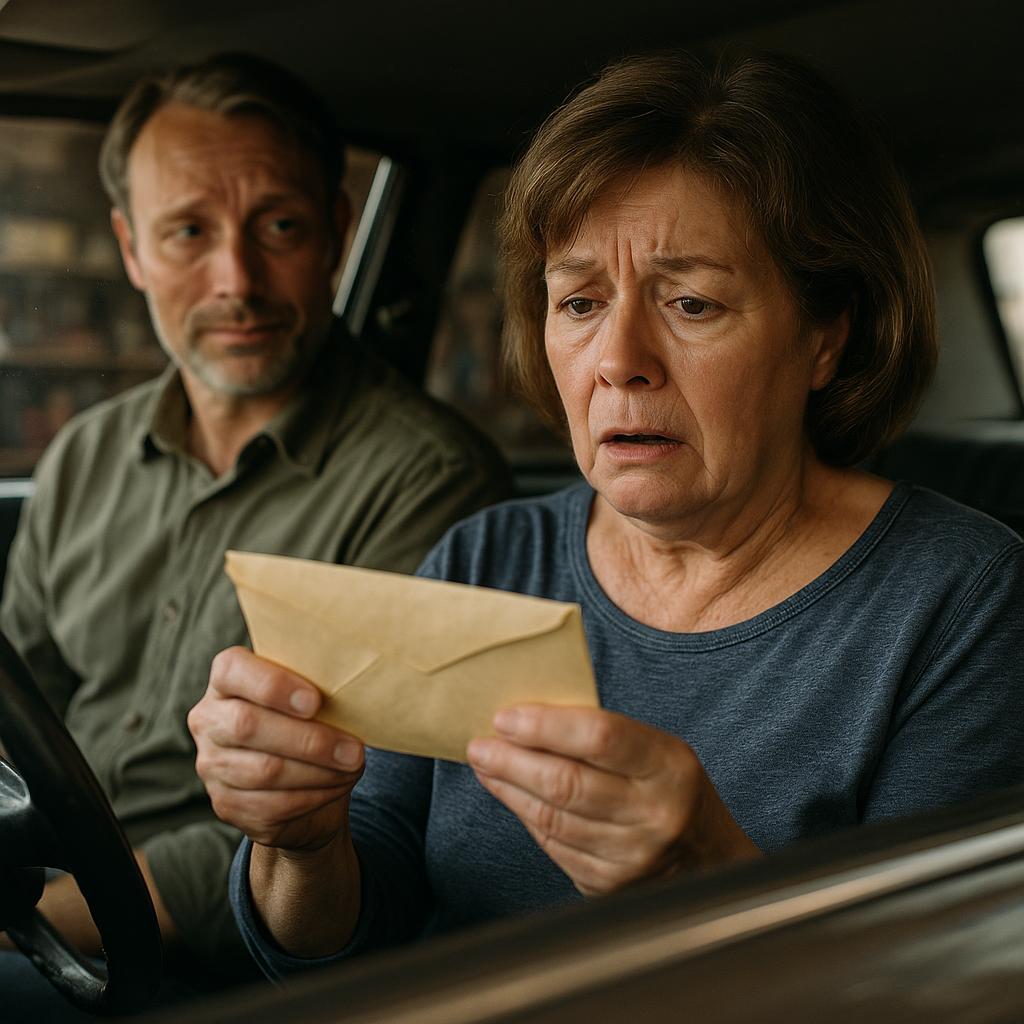 Image by RM AI
Image by RM AI
Mark's Message
I stared at the note, reading it over and over as if the words might change. The key felt impossibly heavy in my palm—small but somehow weighty with secrets. Jacob cleared his throat awkwardly. 'Maybe it's something personal,' he offered, backing away slightly. 'I can give you some privacy.' I barely heard him, my mind racing with possibilities. Mark and I had shared everything—or so I thought. Forty years of marriage, and now this cryptic message from beyond. What truth had he kept from me? Was it about us? About money? Another woman? I felt a flash of anger, then fear. The garage suddenly seemed too small, the air too thick. 'I'm sorry,' I mumbled to Jacob, who looked increasingly uncomfortable. 'I just... I wasn't expecting this.' He nodded understandingly. 'Take your time. I'm in no rush.' But I was. After two years of grief, of carefully preserving Mark's memory like a saint's, this note threatened to unravel everything. I turned the key over in my hand—it looked like it might fit a safe deposit box or a storage locker. Not our home safe; I knew that key by heart. This was something else entirely. Something Mark had deliberately hidden from me until I was ready to let go of his most prized possession. That night, after Jacob left with the Mustang and a promise to send photos once the restoration began, I sat at our kitchen table, the note and key illuminated under the harsh overhead light, wondering what door from my husband's past I was about to unlock.
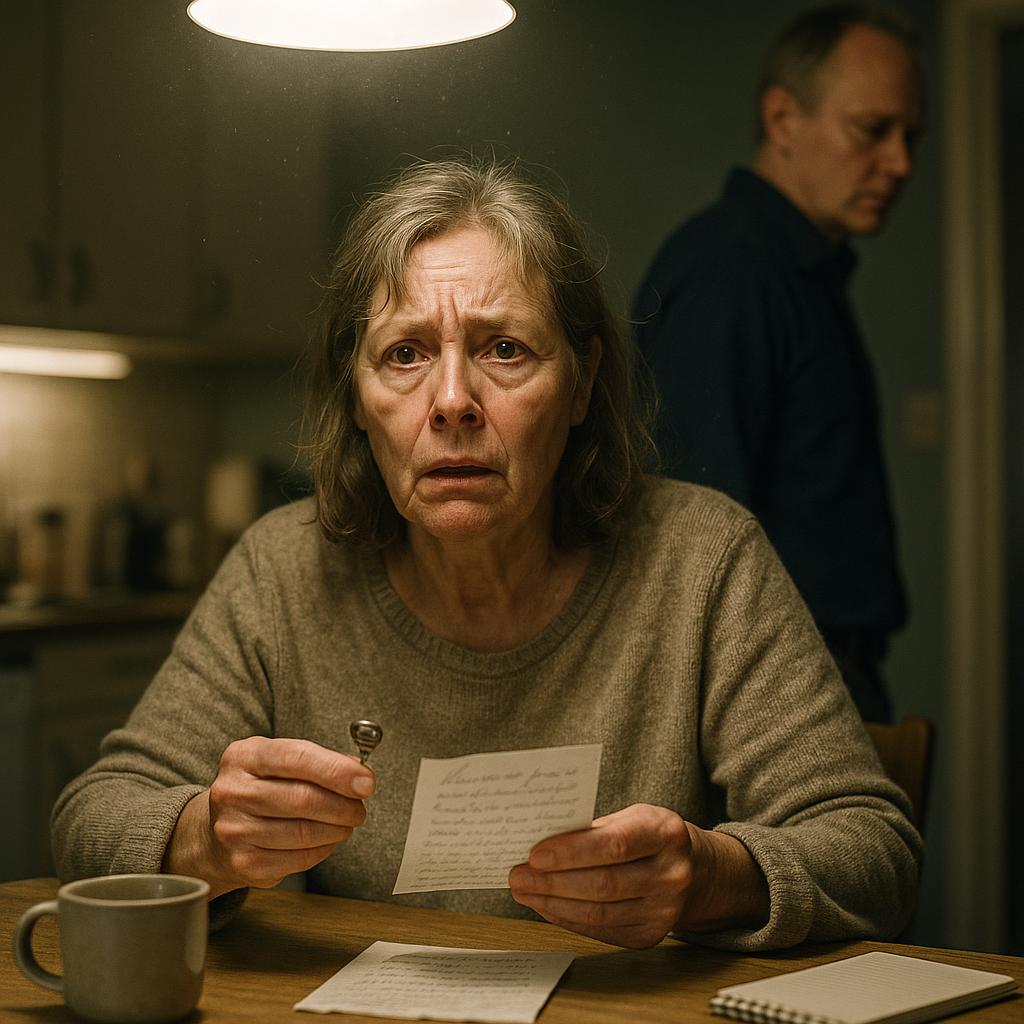 Image by RM AI
Image by RM AI
Jacob's Departure
I held the note in my trembling hands, showing it to Jacob. His expression shifted from curiosity to discomfort faster than a Facebook relationship status update. 'Maybe it's something personal,' he offered, backing away like he'd accidentally opened someone else's DMs. I barely registered his words, my focus entirely on the small key resting in my palm. It wasn't anything special—just a small, brass key that could fit a safe deposit box or storage locker—but it suddenly felt like the heaviest thing I'd ever held. The note's words echoed in my mind: 'it's time you knew the truth.' What truth? Mark and I had shared a bathroom, a bed, and a life for forty years. What could he possibly have kept from me that warranted this cloak-and-dagger routine? Jacob shifted his weight from one foot to the other, clearly caught in that awkward space between human curiosity and polite distance. 'I can come back another time if you need...' he suggested, but I shook my head. The transaction needed to be completed. As Jacob prepared to drive away with Ruby, I stood in my driveway clutching a mystery that threatened to unravel everything I thought I knew about my marriage. That night, sleep was as elusive as affordable housing for millennials. I kept staring at the key on my nightstand, wondering what Pandora's box I was about to open.
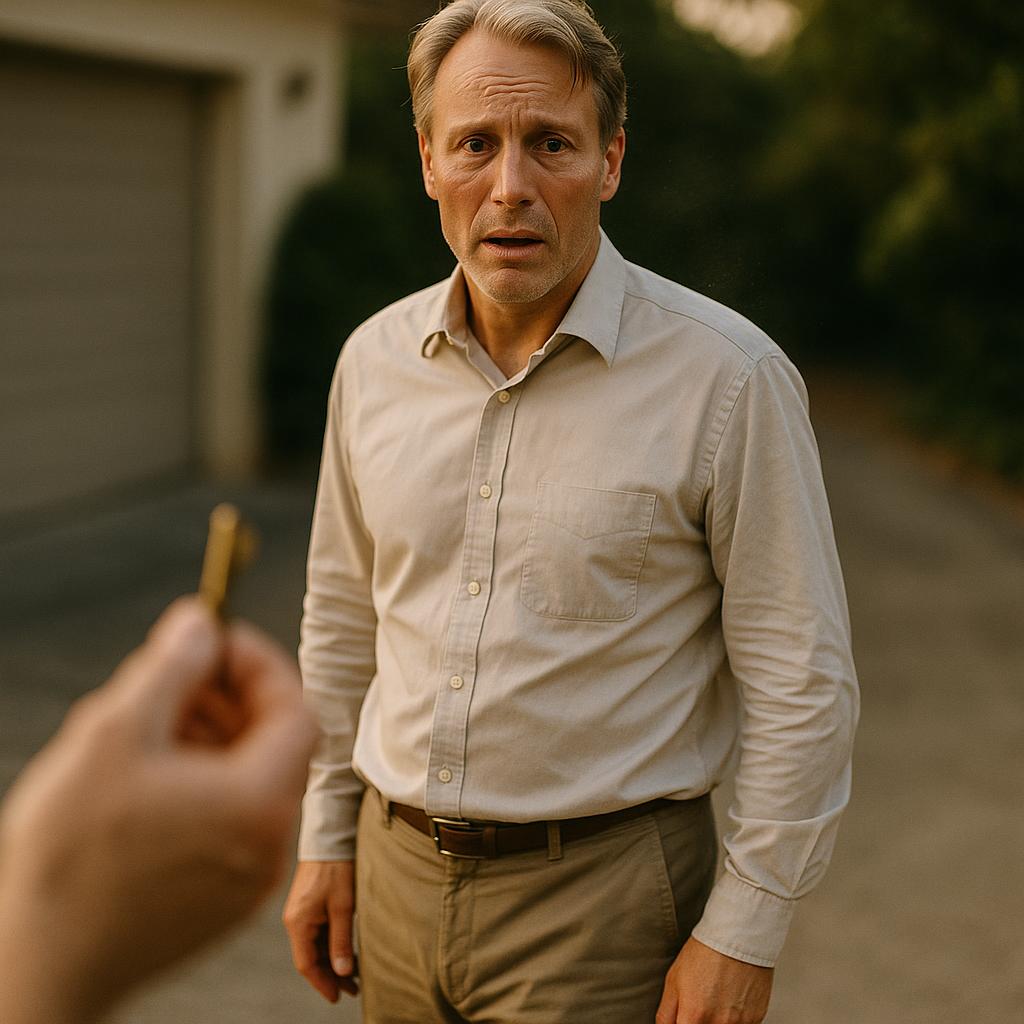 Image by RM AI
Image by RM AI
Sleepless Night
That night, I tossed and turned like a boat on stormy seas, the moonlight streaming through my bedroom window and catching on the small brass key that now sat on my nightstand. Every time I closed my eyes, I saw Mark's handwriting: 'it's time you knew the truth.' What truth? The man I'd shared my life with for nearly forty years wasn't secretive—or at least, I'd never thought he was. We'd faced our struggles together, mostly financial ones when the kids were in college or when the housing market crashed in '08. But we were partners in everything... weren't we? I picked up the key for the hundredth time, its metal cool against my fingertips. It was small, like it might open a safe deposit box or a storage locker. Not our home safe—I knew that key by heart. This was something else entirely. Something Mark had deliberately hidden in that glove box, waiting for the day I'd be ready to let go of his beloved Mustang. I glanced at the clock: 3:17 AM. In just a few hours, the banks would open, and I could start making calls. Part of me wanted to throw the key away, to preserve the Mark I thought I knew. But another part—the part that had survived losing him—needed answers. Whatever door this key opened, whatever truth waited on the other side, I had a sinking feeling it would change everything I thought I knew about our life together.
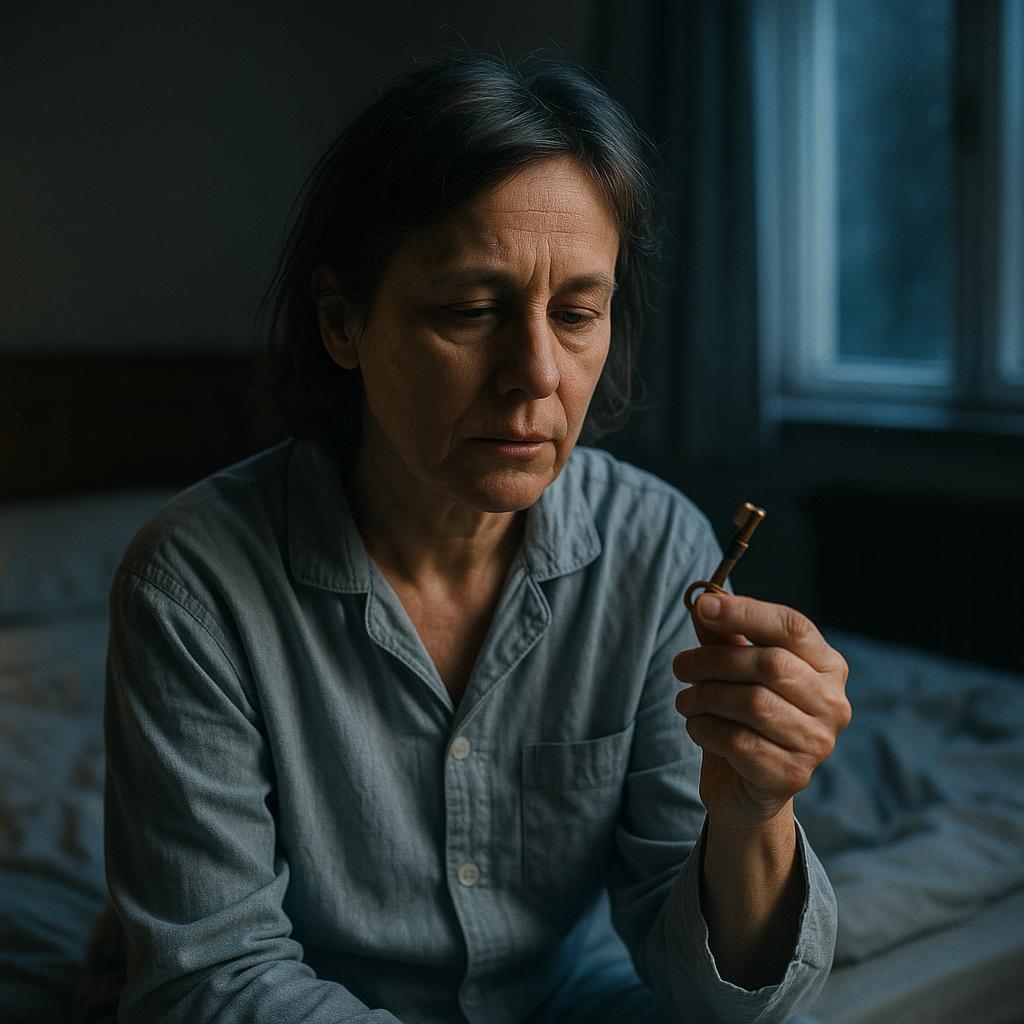 Image by RM AI
Image by RM AI
The Bank Visit
I barely slept before calling First National Bank at 9:01 AM sharp. My voice trembled as I asked the customer service rep if Mark had a safe deposit box. 'Let me check our records, Mrs. Wilson,' she said, putting me on hold long enough for me to bite my nails down to nothing. When she returned, her hesitation spoke volumes. 'Yes, there is a box registered to both you and your late husband. It hasn't been accessed in... over two years.' My heart skipped. Two years—right before Mark died. I drove to the bank in a daze, gripping the steering wheel so tightly my knuckles turned white. The young clerk who escorted me to the vault kept glancing at me with that 'poor widow' look I'd grown to hate. 'Take all the time you need,' he said, leaving me alone in a sterile little room with the metal box between us. For a moment, I just stared at it. This wasn't like finding an old love letter or forgotten anniversary card—this was deliberate secrecy. My hands shook so badly I dropped the key twice before finally sliding it into the lock. The mechanism clicked with finality, like the sound of truth demanding to be heard. Inside were several envelopes, neatly stacked, the top one labeled simply: 'For Ellen.' Forty years of marriage, and suddenly I felt like I was meeting a stranger.
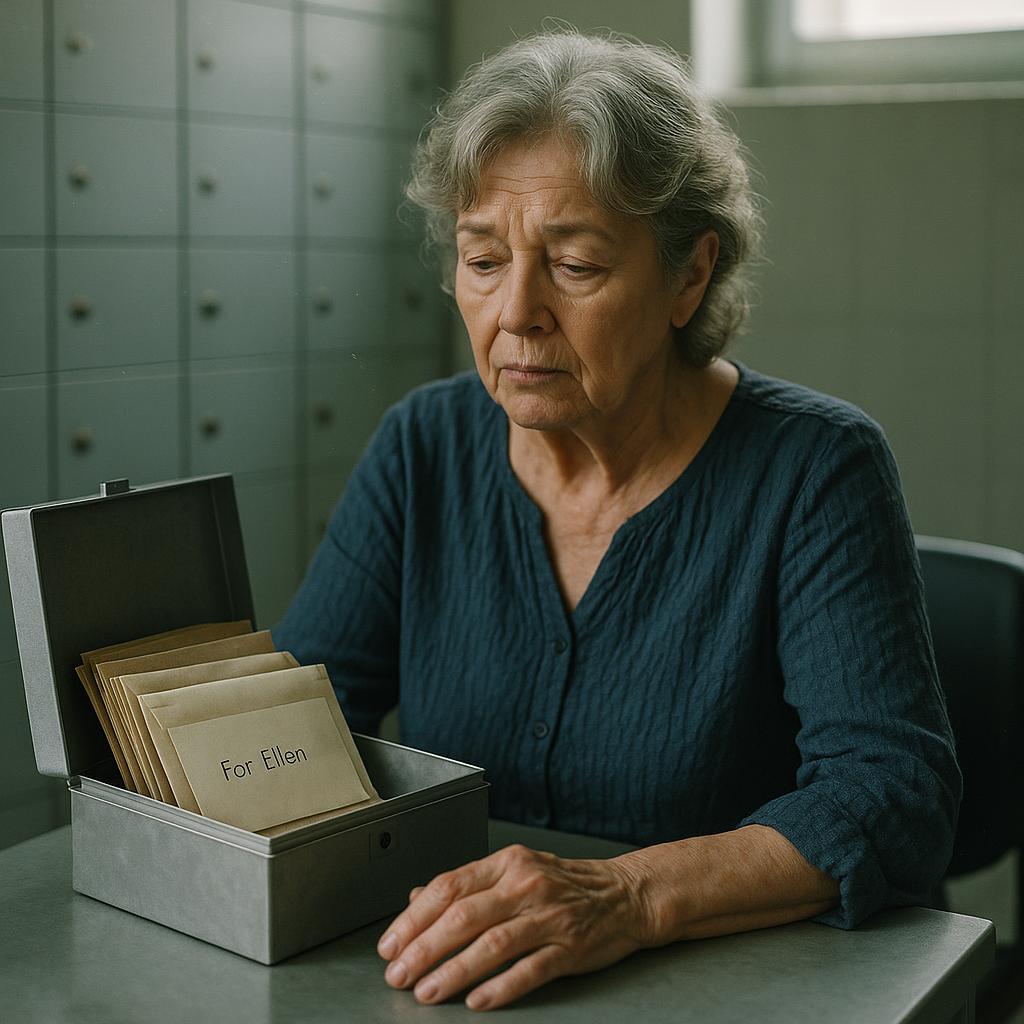 Image by RM AI
Image by RM AI
The First Letter
With trembling fingers, I opened the first envelope labeled 'For Ellen.' Inside was a letter, longer than the note from the glove box, written in Mark's familiar handwriting that suddenly felt like it belonged to a stranger. 'My dearest Ellen,' it began, 'I've carried this secret for too long.' As I read further, my stomach twisted into knots. Mark confessed that years ago, when his brother Pete's business was failing, he'd helped him hide assets from the IRS—significant amounts of cash kept completely off the books. 'I thought I was doing the right thing for family,' he wrote, 'but I've regretted it every day since. If you're reading this, it means I never found the courage to tell you face-to-face. The money isn't gone. It's still hidden.' I had to set the letter down, my vision blurring with tears. The bank's fluorescent lights suddenly seemed too harsh, too exposing. Mark, my Mark, had been involved in tax fraud? The man who insisted we claim every penny on our returns, who lectured our children about honesty? I picked up the letter again, scanning for explanations, for the Mark I thought I knew. 'I promised Pete I'd never tell anyone, not even you,' the letter continued, 'because if it came out, Pete could go to prison.' I glanced at the remaining envelopes in the box, each one potentially holding another piece of this puzzle I never knew existed. How well do you really know someone, even after forty years of marriage? And what was I supposed to do with this information now?
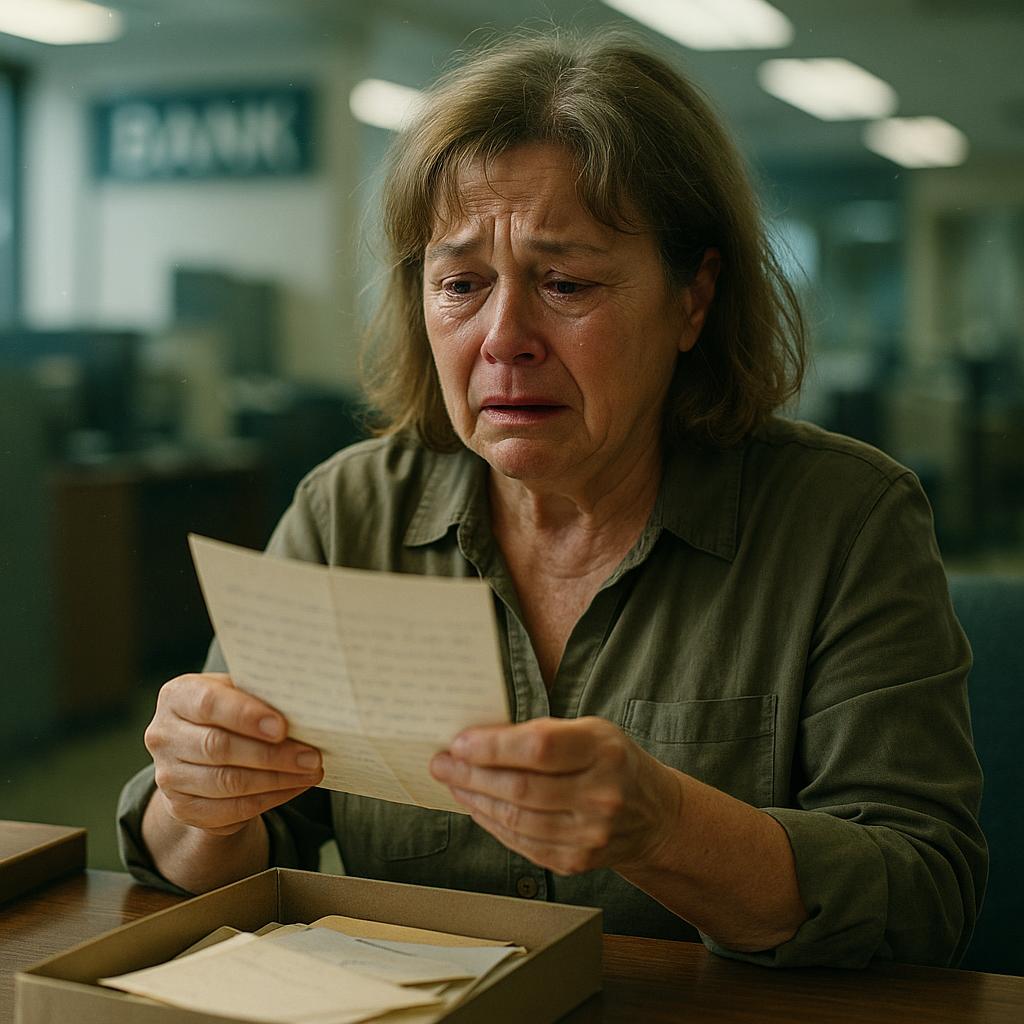 Image by RM AI
Image by RM AI
Mark's Confession
I read Mark's words over and over, my hands shaking so badly the paper rustled like autumn leaves. Tax fraud. My husband—the man who insisted we report the $50 cash gift from my mother on our returns, who lectured our kids about 'doing the right thing even when it's hard'—had helped his brother hide money from the IRS. The cognitive dissonance was giving me whiplash. 'I thought I was doing the right thing for family,' he'd written, but the irony wasn't lost on me. Wasn't I his family too? Didn't I deserve the truth? I set the letter down and took a deep breath, trying to process this revelation in the sterile bank room with its too-bright fluorescent lighting. The money was still hidden somewhere, waiting like a time bomb. Mark had carried this secret to his grave, this burden he couldn't bring himself to share with me during our forty years together. I felt a complex cocktail of emotions—betrayal that he'd kept this from me, anger that he'd put us at risk, and oddly, a strange tenderness knowing he'd been protecting his brother. The Mark I knew was still in these pages—loyal to a fault, even when that loyalty was misplaced. But now I had a choice to make. What exactly was I supposed to do with illegal money I never knew existed? And more importantly, who else knew about it?
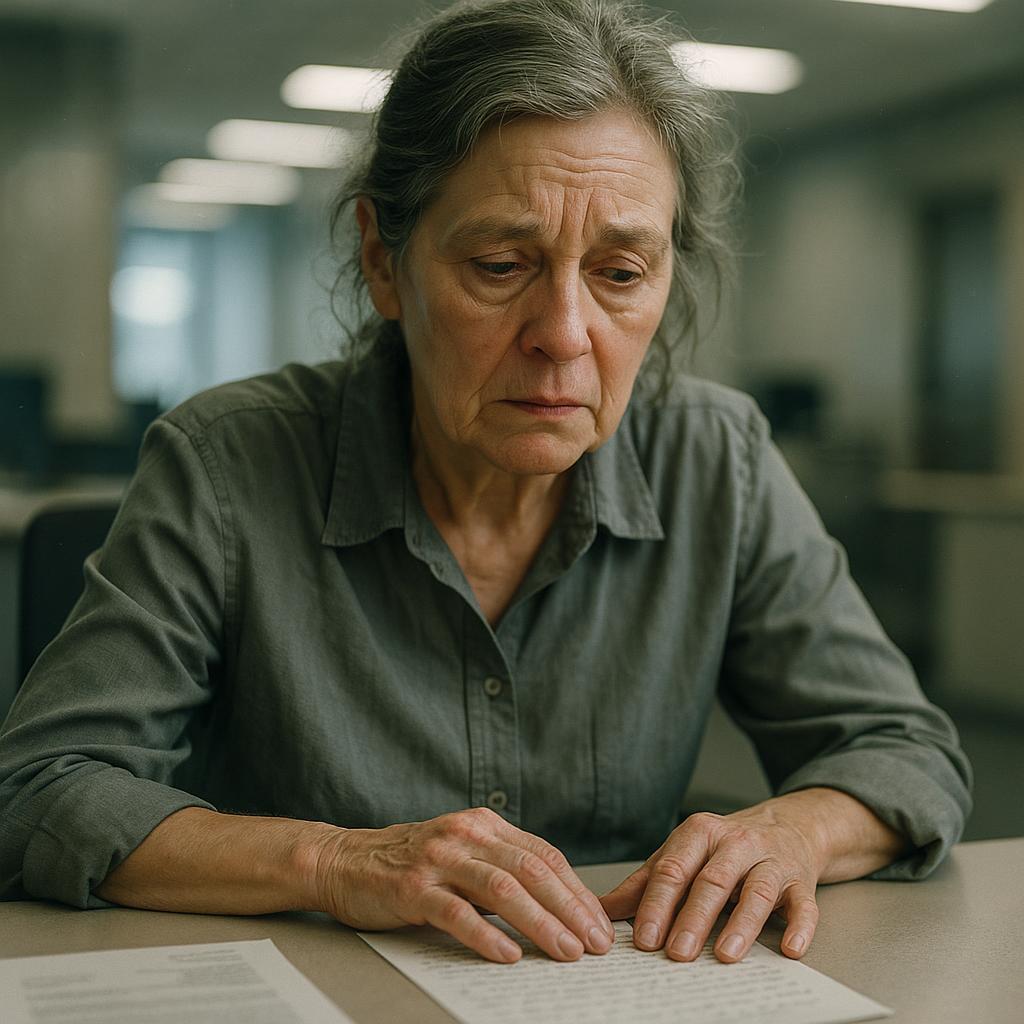 Image by RM AI
Image by RM AI
The Photograph
I reached for the second envelope with hands that wouldn't stop trembling. Inside was a faded photograph, its colors washed out like an Instagram filter gone wrong. It showed a run-down storage facility—the kind you see on those reality TV shows where people bid on abandoned units. Scribbled on the back in Mark's handwriting was simply '147.' I stared at it for what felt like hours, tracing the number with my fingertip. This was it—the place where my husband had hidden money that wasn't his to hide. Part of me wanted to shove everything back in the safe deposit box and walk away. I could pretend I'd never seen any of it, go back to being just another widow trying to make ends meet. But the other part—the part that had spent two years sleeping on Mark's side of the bed just to feel close to him—needed answers. I slipped the photo into my purse and closed the metal box with a decisive click. The bank clerk gave me that sympathetic smile again as I passed him on my way out. If only he knew what I was carrying. That night, I pulled up Google Maps and searched for storage facilities in our area. There were dozens, but something told me this place wouldn't be easy to find. After all, you don't hide illegal money somewhere obvious. As I finally drifted off to sleep, I wondered what I'd find behind door 147—and who else might be looking for it.
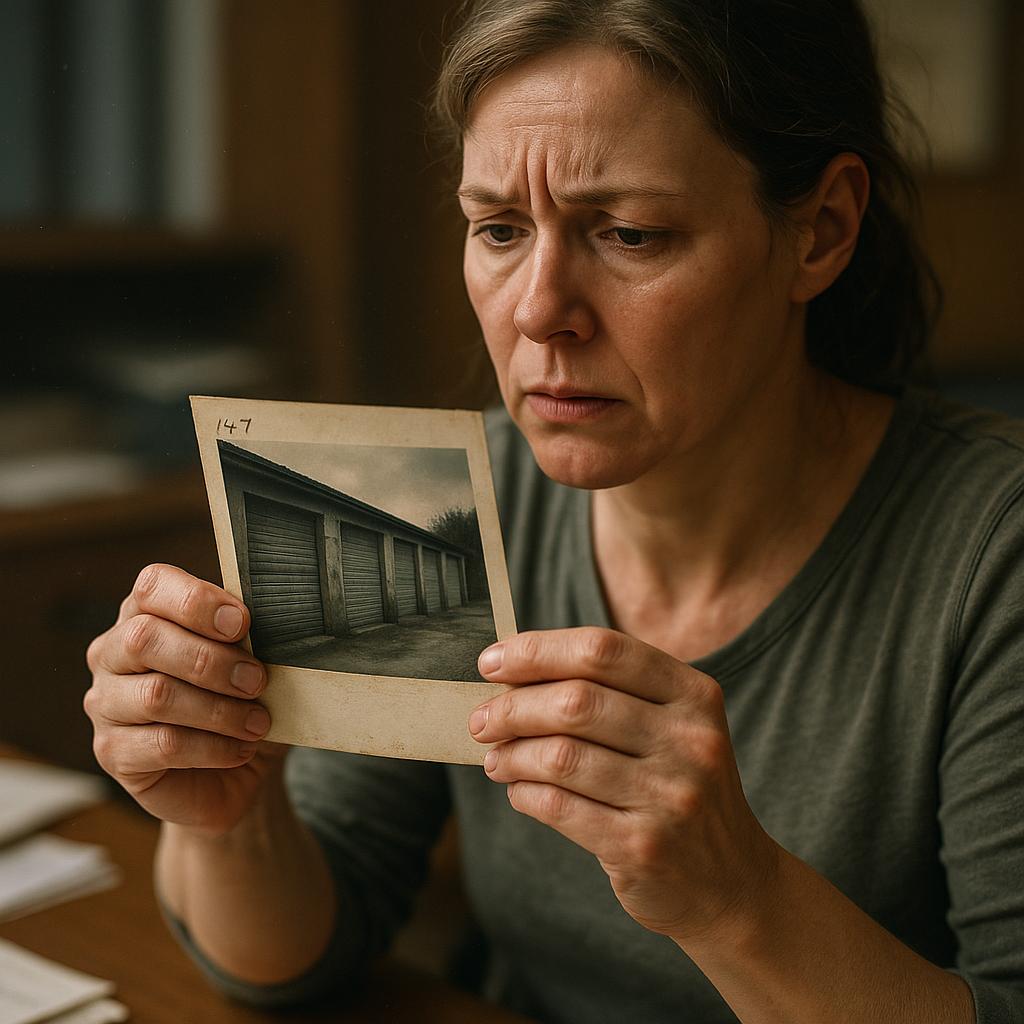 Image by RM AI
Image by RM AI
Memories of Mark
The drive home from the bank felt surreal, like I was floating through someone else's life. Traffic lights blurred as tears welled in my eyes. Mark and I had shared everything—or so I thought. I remembered our wedding day, how he'd looked at me with those honest brown eyes as he promised 'for better or worse.' I remembered the day we bought our first house, how we'd celebrated with cheap champagne on the empty living room floor. And Lila's birth—how Mark had held her with trembling hands, whispering promises to always protect her. Had there been signs I'd missed? Like that time our furnace died in the middle of winter, and Mark somehow found $3,000 for a replacement when our account had been nearly empty the week before. Or when Lila needed emergency dental surgery during her college years, and Mark had waved away my concerns about the cost. 'Don't worry about it, Ellen,' he'd said. 'I've got it covered.' I'd been so relieved, so grateful, that I never questioned where the money came from. Had I been willfully blind? Or just trusting? The steering wheel felt cold under my white-knuckled grip as another memory surfaced—Mark's brother Pete visiting years ago, the two of them whispering in the garage late into the night. I'd thought they were just reminiscing, maybe sharing a beer and old stories. Now I wondered what secrets had been exchanged under the hood of that Mustang while I slept, blissfully unaware that my husband was living a double life.
 Image by RM AI
Image by RM AI
The Storage Facility
The next morning, I found myself driving to the storage facility with my heart in my throat. Google Maps had led me to a place that looked like it had been forgotten by time itself—rusted gates hanging off their hinges, weeds pushing through cracked concrete, and a sign so faded you could barely make out the name. It was the kind of place you'd drive past a hundred times without noticing, which I suppose was exactly the point. I parked my car and sat there for a moment, questioning everything I thought I knew about my life with Mark. The facility looked nearly abandoned, with most units showing signs of long-term neglect. I walked slowly down the row, scanning the numbers until I found it—147. The paint was peeling, but the numbers were still visible, like they were waiting just for me. My hands trembled as I fitted the small key into the lock. It turned with surprising ease, as if it had been recently oiled. The door groaned as I pulled it up, revealing a space about the size of our guest bathroom. In the center sat a single metal trunk, covered in a thick layer of dust except for what looked like fingerprints near the lock. Someone had been here before me. I knelt down, my knees protesting against the concrete floor, and used the same key to open the trunk. The lid creaked open, and I gasped so loudly the sound echoed off the metal walls. Staring back at me were neat stacks of cash—dozens of bundles wrapped in yellowed bank bands, organized with the precision that was so characteristically Mark. I picked up one bundle with shaking fingers. The bills were old but real. Very real. There must have been hundreds of thousands of dollars in that trunk. As I sat there surrounded by illegal money, one terrifying thought kept circling in my mind: who else knew about this, and how far would they go to get their hands on it?
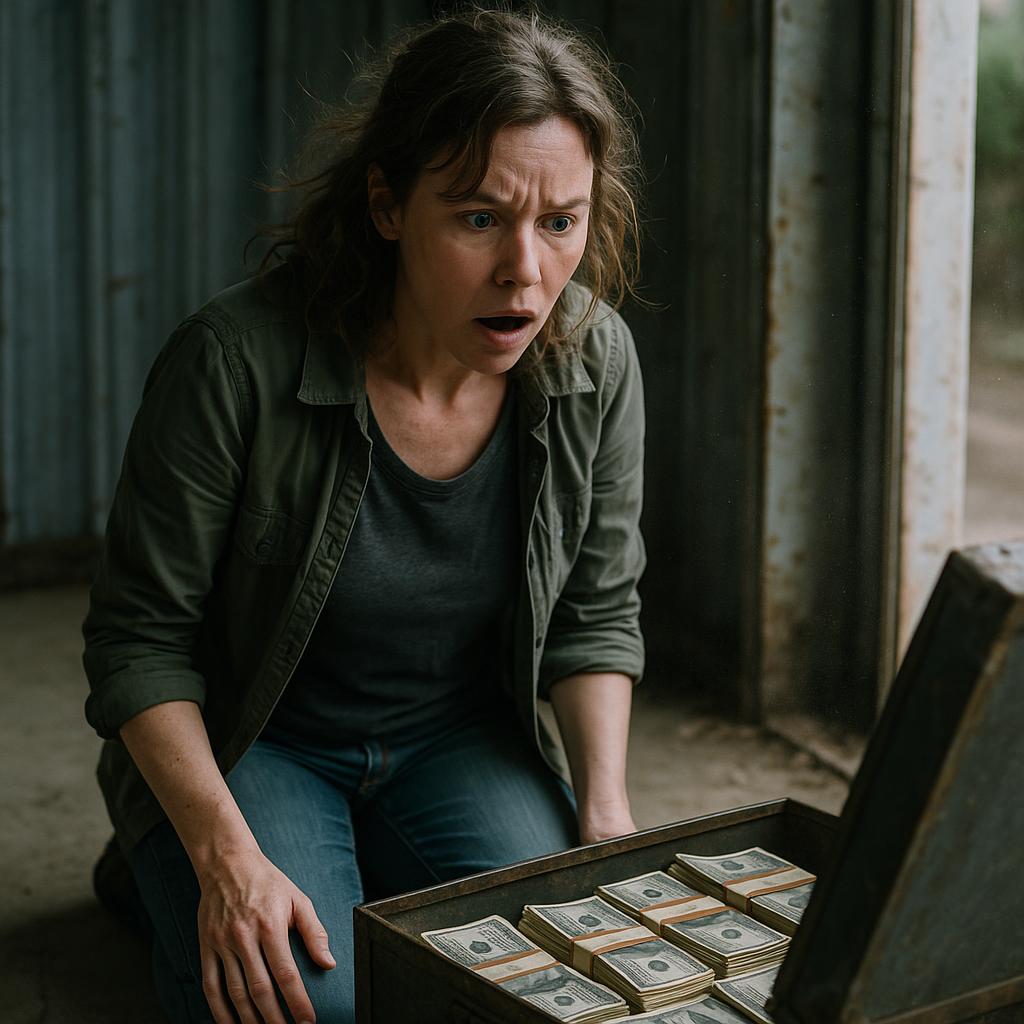 Image by RM AI
Image by RM AI
The Fortune
I sat cross-legged on the concrete floor, surrounded by more cash than I'd ever seen outside of a heist movie. My hands trembled as I picked up bundle after bundle, the rubber bands cracking with age as I thumbed through them. Twenties, fifties, hundreds—all neatly stacked like Mark was preparing for some apocalyptic yard sale. I did a rough calculation in my head and nearly choked. This had to be at least $300,000, maybe more. My first thought wasn't excitement or relief—it was pure, unadulterated panic. What on earth was I supposed to do with this? I couldn't just load it into my Subaru and drive home like I'd been grocery shopping. This wasn't found money; it was stolen. Hidden. Illegal. Every fiber of my 63-year-old being that had dutifully reported even the smallest income on our tax returns for decades was screaming in protest. I pulled out my phone, my finger hovering over Lila's contact. My daughter always knew what to do in a crisis—but was this something I should drag her into? The dust from the storage unit floor had settled on my pants, and I absently brushed it away, wondering how many other secrets Mark had kept buried. As I stared at the fortune before me, one terrifying thought kept circling: if Pete's family knew about this money, they might come looking for it. And something told me they wouldn't be sending a polite email to claim their inheritance.
 Image by RM AI
Image by RM AI
Calling Lila
I sat in my car outside the storage facility for nearly an hour, staring at my phone. Finally, I called Lila. My fingers trembled as I recounted everything—the note, the key, the safe deposit box, and now this trunk full of cash that could solve all my financial worries. When I finished, the silence on the other end stretched so long I thought we'd been disconnected. 'Lila? Are you there?' 'I'm processing, Mom,' she finally said, her voice unnaturally calm. Then came the words that sent a chill down my spine. 'This could solve everything. You could finally retire comfortably. No one needs to know.' I wanted to believe her—wanted to embrace the easy solution she was offering. The money would certainly make my life easier. No more pinching pennies, no more worrying about property taxes or whether I could afford to fix the leaking roof. But something in Lila's tone made my stomach knot. She sounded almost... eager. Too eager. Like she'd already spent the money in her mind. 'It's not that simple, honey,' I said carefully. 'This money... it's not clean.' 'Mom,' she said with an exasperated sigh I recognized from her teenage years, 'Uncle Pete's been dead for years. The IRS isn't exactly hunting for this cash. It's just sitting there, waiting for someone to use it. Why shouldn't that someone be you?' Her logic was tempting, but the uneasiness in my gut wouldn't subside. What would Mark want me to do? And more importantly, what kind of example would I be setting for my daughter if I took the easy way out?
 Image by RM AI
Image by RM AI
The Moral Dilemma
I hauled that trunk into my basement like I was smuggling contraband—which, technically, I was. After triple-checking the locks, I collapsed into bed, physically and emotionally drained. But sleep? Forget about it. My mind was like a browser with too many tabs open. I kept imagining what I could do with all that money—pay off the mortgage that had been hanging over my head since Mark died, help Lila finally escape her student loan nightmare, maybe even book that Mediterranean cruise Mark and I had always pinned to our someday board. But each daydream came with a pop-up notification: 'This money was obtained illegally.' I tossed and turned, the moonlight casting shadows across my bedroom ceiling. What would Mark want me to do? The man who taught our daughter to return extra change when a cashier made a mistake was the same man who'd hidden hundreds of thousands of dollars from the government. The contradiction made my head spin. Around 3 AM, I grabbed my phone and started Googling 'statute of limitations tax fraud' and 'what happens if you find illegal money.' Not exactly the midnight scrolling most widows my age were doing. By morning, I had dark circles under my eyes and absolutely no answers—just a growing sense that whatever decision I made would change everything. Little did I know, someone else had already made plans for that money.
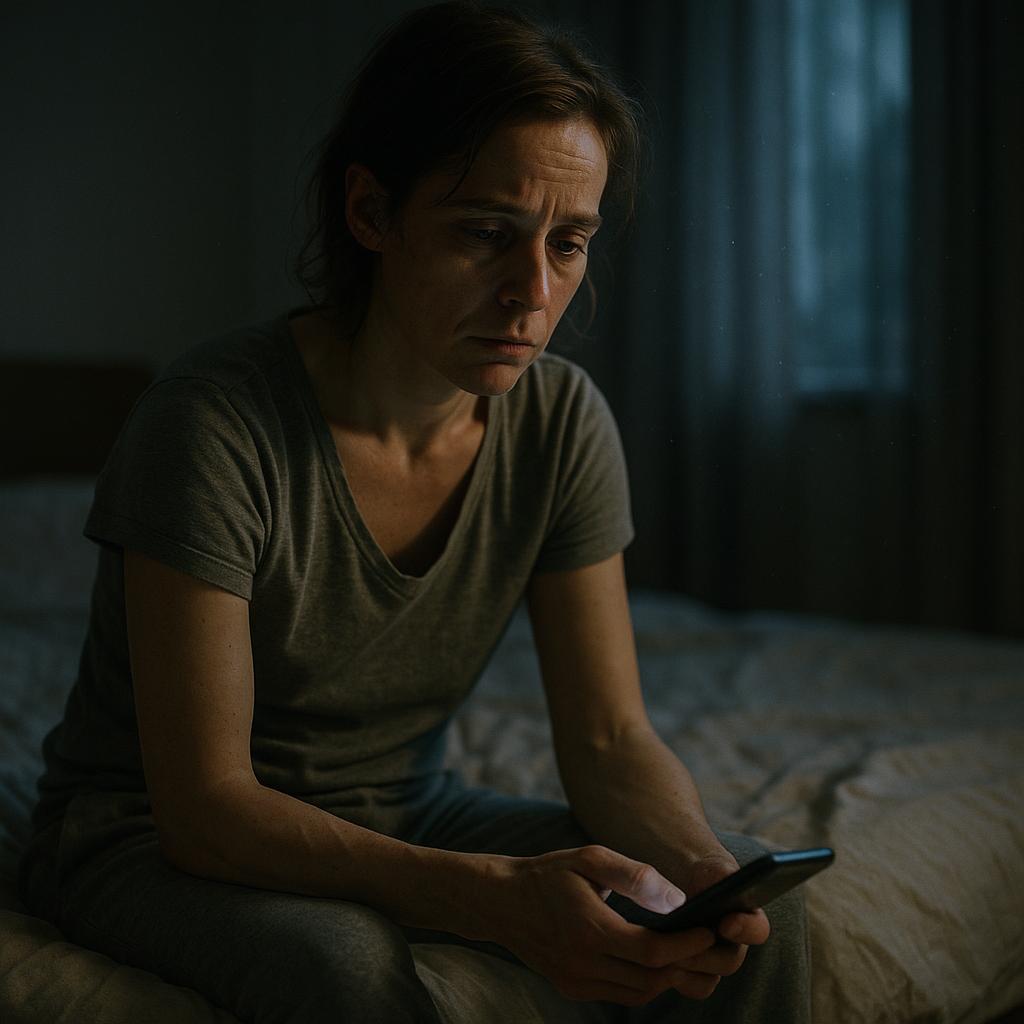 Image by RM AI
Image by RM AI
The Missing Trunk
I woke up the next morning with a headache and that foggy feeling you get after a night of tossing and turning. I shuffled down to the basement in my slippers, coffee mug in hand, ready to face my moral dilemma head-on. But when I flicked on the light, my mug slipped from my fingers and shattered on the concrete floor. The trunk was gone. Completely vanished, as if it had never existed. The dusty outline on the floor was the only evidence it had ever been there. My heart hammered against my ribs as the realization hit me—someone had been in my house while I slept. Someone who knew exactly what they were looking for. I stood frozen, coffee pooling around my feet, as my mind raced through possibilities. The doors had been locked, the windows secured. This wasn't some random break-in. My thoughts immediately went to Lila and her unsettling eagerness on the phone yesterday. 'This could solve everything,' she'd said, her voice carrying that familiar tone she'd had since childhood whenever she wanted something badly. I'd heard it when she begged for a puppy at eight, when she wanted that expensive prom dress at seventeen, and now, at thirty-six, when talking about her uncle's hidden fortune. My own daughter. I grabbed my phone with trembling hands, ready to confront her, when I noticed something else—a small piece of paper where the trunk had been. A note, written in handwriting I didn't recognize: 'Family business stays in the family.'
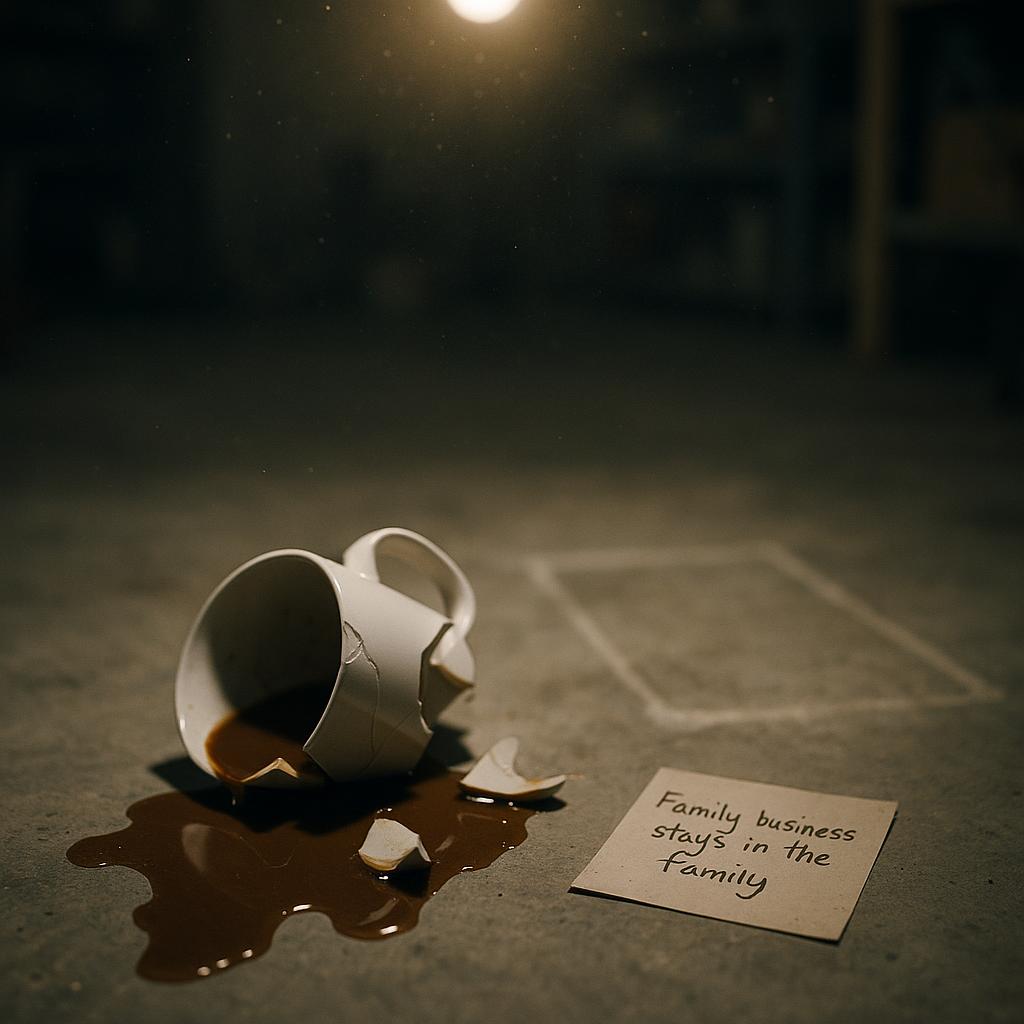 Image by RM AI
Image by RM AI
Confronting Lila
I called Lila first thing in the morning, my voice shaking with a mixture of disbelief and rage. 'The trunk is gone, Lila. Did you take it?' The silence on the other end spoke volumes before she finally answered. 'Mom, I was just trying to help.' I gripped the phone so tightly my knuckles turned white. 'Help? By breaking into my house and stealing from me?' She had the audacity to sound offended. 'It's not stealing if it's family money!' I reminded her she'd been over last night 'just to check on me,' and suddenly the timing made perfect sense. While I was making us tea, she must have slipped down to the basement. My own daughter. When I pressed her further, she became defensive, her voice rising. 'I'm protecting the family legacy, Mom! You were going to do something stupid like turn it in!' Her words felt like a slap across my face. 'Mark wouldn't have wanted—' I started, but she cut me off. 'Dad kept it hidden for a reason!' What hurt most wasn't the missing money—it was realizing that Lila had inherited more than just Mark's eyes and smile. She'd also picked up his capacity for deception. As I hung up the phone, I wondered if there was anyone left in my life I could actually trust, or if secrets were simply the Wilson family business.
 Image by RM AI
Image by RM AI
The Silent Treatment
For five straight days, I called Lila's number until I could recite her voicemail greeting from memory. 'Hey, it's Lila! Leave a message and I'll call you back!' Except she wouldn't. Not this time. I left messages that evolved from concerned to angry to downright pleading. 'Lila, honey, we need to talk about this.' Then: 'This isn't just about money—it's about trust!' And finally: 'Please, sweetheart. I'm your mother.' Nothing but silence in return. The house felt cavernous without her weekly visits, the walls seeming to close in on me at night. I'd catch myself talking to Mark's old armchair as if he were still in it, asking him how our daughter could do this. How he could have done this. The betrayal felt like a physical weight on my chest—first from my husband of forty years, now from the child we'd raised together. I wandered from room to room, picking up framed family photos and wondering if every smile held a secret. Had I been the only honest one all along? The worst part wasn't even the missing money—it was the realization that the two people I'd loved most in this world had both chosen deception over truth. I jumped every time the phone rang, hoping it might be Lila, but it was always telemarketers or concerned friends wondering why I'd missed book club. How could I explain that my life had become an episode of some crime drama? Then, exactly one week after our confrontation, my doorbell rang at 7 AM. When I opened it, there stood a man I'd never seen before, with Mark's eyes and Pete's jawline. 'Aunt Ellen,' he said gravely, 'I think you found something that doesn't belong to you.'
 Image by RM AI
Image by RM AI
The Nephew's Call
I was folding laundry when my phone rang with an unknown number. Against my better judgment, I answered. 'Hello?' The voice on the other end was deep, unfamiliar, and sent immediate chills down my spine. 'Aunt Ellen,' he said with an unsettling familiarity, 'I think you found something that doesn't belong to you.' My hand froze mid-fold, the warm towel suddenly feeling cold in my grip. He introduced himself as Pete's son—Mark's nephew—someone I'd met maybe twice at family gatherings years ago. 'I don't know what you're talking about,' I lied, my voice betraying me with a slight tremor. He chuckled, the sound hollow and threatening. 'The storage unit, Aunt Ellen. Unit 147. The money.' My blood ran cold as he explained that Mark had promised to keep that money hidden until Pete's debts were 'resolved.' 'That money was meant to protect the family,' he continued, his tone hardening. 'Don't do anything you'll regret.' The threat hung in the air between us. I wanted to tell him the trunk was already gone—that Lila had taken it—but something stopped me. Something didn't add up. How did he know I'd found the money? And why was he calling now, after all these years? 'I need time to think,' I managed to say before hanging up. I sat on the edge of my bed, phone clutched in my trembling hand, wondering just how deep this family conspiracy went and who else might come knocking on my door.
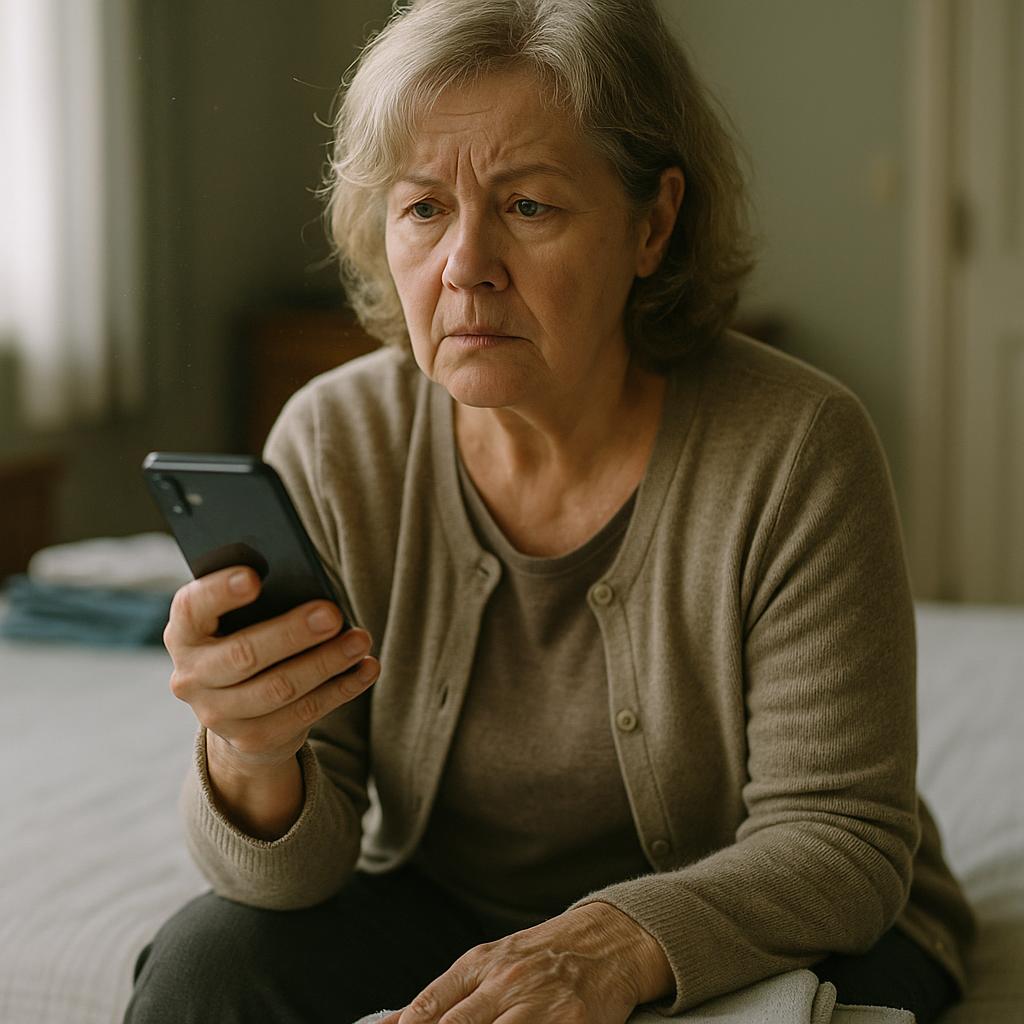 Image by RM AI
Image by RM AI
The Threat
I hung up the phone and sat there, my hands shaking like autumn leaves. Something about that call felt wrong—all wrong. Pete's son hadn't spoken to me since Mark's funeral two years ago, where he'd barely managed a stiff 'sorry for your loss' before disappearing into the crowd. Now suddenly he was concerned about 'family protection'? Please. I may be 63, but I wasn't born yesterday. I poured myself a glass of wine—at 11 AM, judge me if you want—and tried to piece it all together. If Mark had been hiding this money for Pete, why hadn't Pete's son come looking for it immediately after Mark died? Why wait until now? And how did he even know I'd found it? Unless... someone had told him. My mind immediately went to Lila. Had she contacted him after taking the trunk? Or was there someone else watching me—following me to that storage unit? I shuddered at the thought. The wine glass trembled in my hand as another possibility surfaced: what if this money wasn't what Mark's note suggested? What if it wasn't just hidden assets from the IRS, but something far worse? I needed answers, and I knew exactly where to start looking. I pulled out the last envelope from the safe deposit box—the one I hadn't opened yet. As I carefully broke the seal, I had no idea that what I was about to discover would make me question everything I thought I knew about my husband.
 Image by RM AI
Image by RM AI
The Final Letter
My hands trembled as I unfolded the last note, tucked carefully beneath the photograph. 'To whoever comes looking,' it read, and my heart sank. Mark's handwriting, once so familiar and comforting, now felt like a stranger's. As my eyes scanned the page, each word hit me like a physical blow. Pete hadn't just hidden money from the IRS—he'd embezzled it from retirement accounts. Real people's savings, their futures, their security. And Mark had helped him hide it. 'I was too ashamed to tell Ellen,' he'd written. 'If anything happens to me, let her decide what's right.' I pressed my hand against my mouth, stifling a sob. All those years, all those moments when I thought I knew him completely—the man who checked our restaurant bills twice to make sure we weren't overcharged, who insisted on returning extra change when cashiers made mistakes—had been living with this terrible secret. The weight of his shame must have been unbearable. Suddenly, Pete's son's desperate phone call made perfect sense. This wasn't family money; it was stolen money. And now I understood why Mark had hidden that key in the Mustang's glove box—he'd wanted me to find it, but only when I was ready to let go of him. Only then would I be strong enough to face the truth and make the right choice. The question was: what exactly was the right choice?
 Image by RM AI
Image by RM AI
The Revelation
I sat at my kitchen table, staring at Mark's final confession until the words blurred together. The truth hit me like a physical blow—this wasn't just tax evasion. Pete had stolen retirement funds from innocent people, and my husband had helped hide the evidence. People who'd worked their whole lives, saving for their golden years, just like Mark and I had done. Except we'd done it honestly. Or so I thought. I felt physically ill, my stomach churning with a mixture of disgust and betrayal. How many families had suffered because of what they'd done? How many elderly couples had to keep working well into their seventies because their nest eggs mysteriously vanished? No wonder Pete's son was so desperate to get his hands on that trunk. It wasn't family money—it was blood money. Evidence of a crime that could still send people to prison. I thought about Lila, who now had possession of stolen funds. Did she understand what she was holding? Or was she just seeing dollar signs, blinded by the immediate relief it could bring to her financial struggles? I picked up my phone, my finger hovering over 911. The right thing to do was crystal clear, but actually doing it felt like betraying my husband all over again. Then again, hadn't he betrayed me first? And not just me—he'd betrayed everything I thought we stood for as a couple, as parents, as decent human beings. I took a deep breath and made the call that would change everything.
 Image by RM AI
Image by RM AI
The Decision to Act
The police station smelled like burnt coffee and desperation—a fitting backdrop for the moral reckoning I was about to face. I clutched Mark's letters in my trembling hands as I sat across from Detective Ramirez, a kind-faced man with tired eyes who'd probably heard every possible human failing in this very room. For nearly an hour, I unraveled the tangled web of secrets my husband had left behind—the hidden money, Pete's embezzlement scheme, my daughter's betrayal, and the threatening call from Pete's son. With each revelation, I felt a strange mixture of shame and relief washing over me. 'You're doing the right thing, Mrs. Thompson,' Detective Ramirez said when I finally finished, his pen pausing over his notepad. 'Not everyone would.' His words hit me harder than I expected. How many wives would turn in evidence that could tarnish their late husband's memory forever? How many mothers would risk sending their own daughter to jail? 'What happens now?' I asked, my voice barely above a whisper. He explained they'd need to investigate everything—interview Pete's son, track down the missing funds, and yes, eventually talk to Lila. My heart constricted at the mention of my daughter's name. 'We'll handle this as delicately as possible,' he promised, but we both knew there was nothing delicate about fraud investigations. As I signed my statement, I wondered if I'd just made the biggest mistake of my life—or finally done something right.
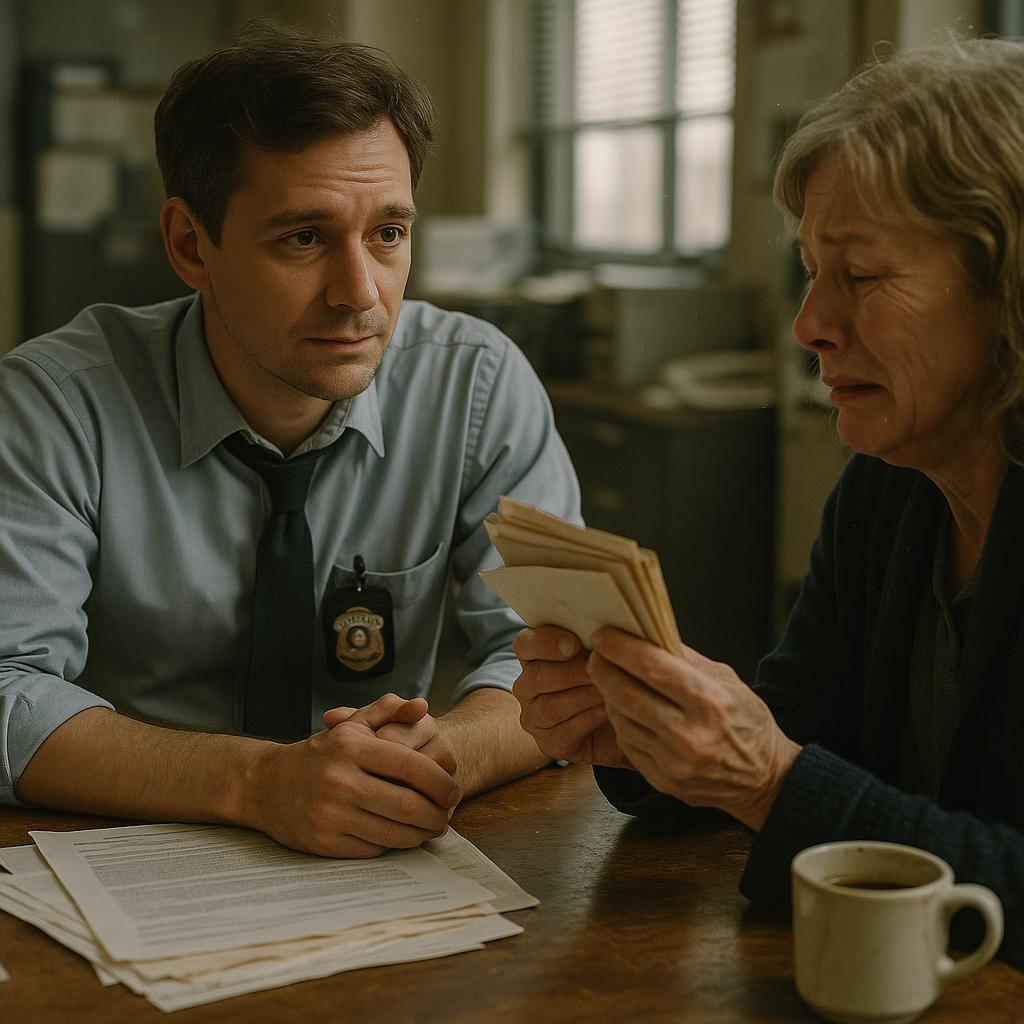 Image by RM AI
Image by RM AI
The Arrest
Three days after my visit to the police station, Detective Ramirez called with news that made me sink into my kitchen chair. Pete's son had been arrested at a storage facility two states over, attempting to access what appeared to be another stash of hidden money. 'We found him with fake IDs and a rental truck,' Ramirez explained. 'He was planning to disappear with whatever was in that unit.' Apparently, after I'd gone to the police, they'd started monitoring known associates of Pete's family. When they questioned Lila, she broke down and admitted everything—including how Pete's son had contacted her after she took the trunk, demanding his 'inheritance.' The detective assured me that while the money from my basement had been seized as evidence, I wouldn't be held financially responsible for any of it. 'You did the right thing, Mrs. Thompson,' he said for the second time that week. Those words should have felt like a victory, but instead, they landed like a bittersweet consolation prize. I'd done the right thing, yes, but at what cost? My husband's reputation. My daughter's trust. Our family's privacy. Yet despite everything, I felt an unexpected sense of peace washing over me—like I'd finally put down a heavy burden I'd been carrying. That night, I sat on my back porch watching the sunset, wondering what Mark would think of me now. Would he be angry that I'd exposed his secret? Or would he be proud that I'd chosen truth over comfort? The strangest part was, I was starting to realize it didn't matter anymore what he would think. What mattered was what I thought of myself.
 Image by RM AI
Image by RM AI
Jacob Returns
The doorbell rang on a Tuesday afternoon, exactly one month after the whole mess with the police and Pete's son had started to settle down. When I opened the door, I was shocked to see Jacob—the man who'd bought Mark's Mustang—standing on my porch with an awkward smile and a box of donuts. 'Hope this isn't weird,' he said, 'but I couldn't stop thinking about that note you found.' I invited him in, grateful for a friendly face after weeks of police interviews and uncomfortable family dinners where Lila and I tried to rebuild what we'd broken. Jacob sat at my kitchen table, turning his coffee mug in circles as he explained. 'I got curious and did some digging,' he admitted. 'Your husband bought that Mustang the same week he opened that storage unit. The dates match perfectly.' He pulled out some paperwork he'd found while restoring the car—the original purchase receipt with a date that confirmed his theory. 'He must've been hiding the key in plain sight all those years,' Jacob said softly. 'Right under your nose, but somewhere he knew you'd only look when you were ready to let go.' I felt a strange mix of emotions wash over me—anger at Mark's deception, but also a grudging admiration for how thoroughly he'd planned his confession. 'He always did love his secrets,' I said, surprising myself with a sad smile. Jacob hesitated, then asked the question I could see had been burning in his mind: 'Do you regret finding it? The key, I mean. Would you rather not have known?'
 Image by RM AI
Image by RM AI
Finding Peace
I looked at Jacob across my kitchen table, his question hanging in the air between us. 'Do I regret finding it?' I repeated, considering the weight of everything that had happened. 'No,' I finally said, surprising myself with the certainty in my voice. 'The truth hurt like hell, but living with ghosts was worse.' I told him how the past month had been a rollercoaster—Lila and I were slowly rebuilding our relationship through weekly therapy sessions, and the victims of Pete's scheme would eventually get some restitution. 'Mark wasn't a bad man,' I explained, tracing the rim of my coffee mug. 'He just made a terrible choice and didn't know how to unmake it.' Jacob nodded, understanding in his eyes. 'Sometimes the people we love the most are the ones we never fully know,' he said softly. We sat in comfortable silence for a moment before he asked if I'd like to see photos of the Mustang's restoration. As he showed me pictures on his phone, I felt something unexpected—a lightness I hadn't experienced in years. That car, which had once represented all I'd lost, had ultimately delivered exactly what I needed: the truth. Selling it hadn't just cleared space in my garage—it had cleared the ghosts I'd been living with. Sometimes, what we think is clutter turns out to be the key to finally letting go. And as Jacob smiled at me across the table, I wondered if perhaps letting go was just the first step toward something new.
 Image by RM AI
Image by RM AI
The Investigation Deepens
The phone rang at 7:30 AM, jolting me from a fitful sleep. 'Mrs. Thompson? Detective Morales here.' His voice sounded more serious than usual, which I hadn't thought possible. 'We've been digging into Pete's finances, and—' he paused, clearing his throat, '—this goes deeper than we initially thought.' I sat up, clutching the phone tighter. 'What do you mean, deeper?' The detective explained that Pete hadn't been working alone. The embezzlement scheme connected to a larger financial fraud ring operating across three states. Names I'd never heard before were now linked to my husband's brother—and possibly to Mark himself. 'We need your help,' Detective Morales said. 'Would you be willing to go through more of your husband's papers? Look for anything unusual—receipts, notes, names you don't recognize.' I agreed immediately, though my stomach knotted at the thought of uncovering more secrets. What else had Mark hidden from me? How much deeper did this rabbit hole go? After hanging up, I stood in our bedroom—our bedroom—staring at Mark's dresser. For forty years, I thought I knew every inch of this house, every corner of our life together. Now I wondered what other evidence might be hiding in plain sight, waiting for me to finally see it. The worst part wasn't the betrayal anymore—it was realizing that with each new revelation, the man I'd loved was becoming more and more of a stranger.
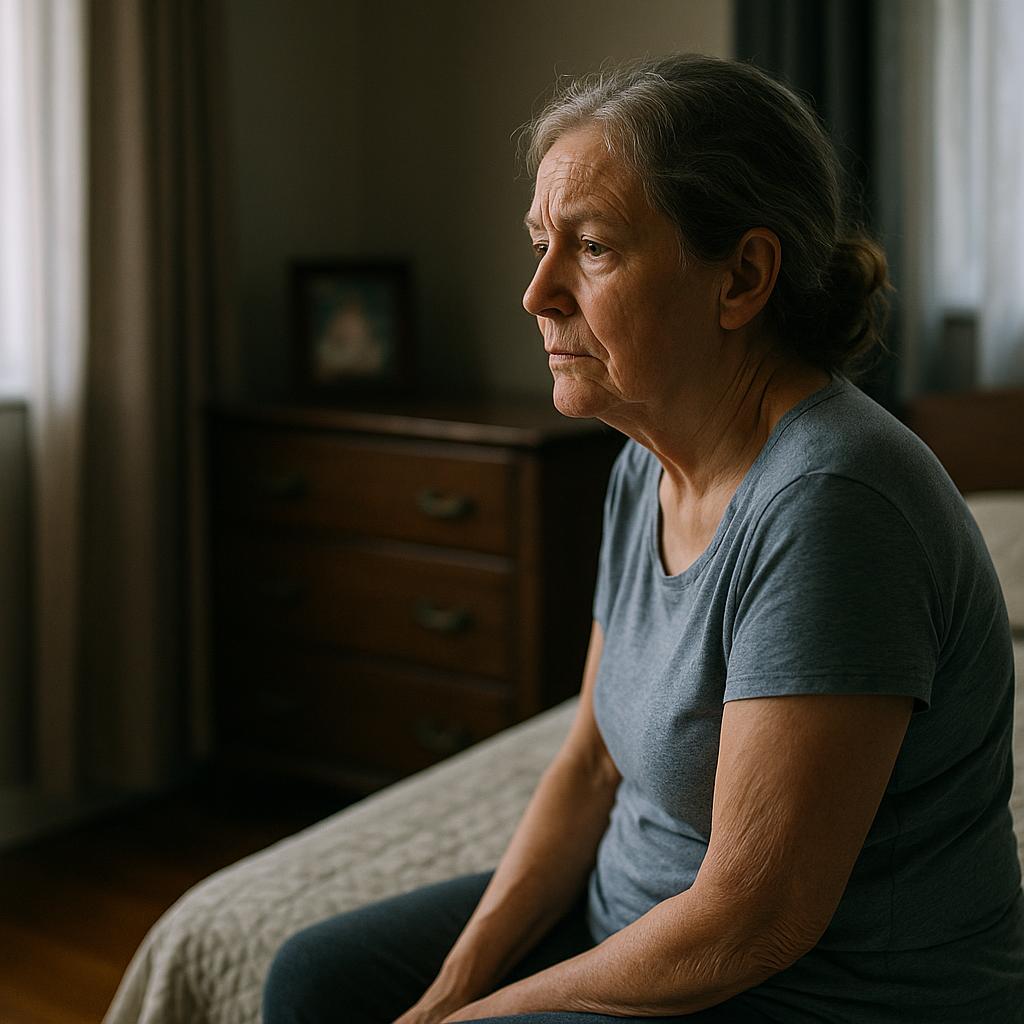 Image by RM AI
Image by RM AI
Lila's Return
I was washing dishes when the doorbell rang. I wasn't expecting anyone, so I dried my hands slowly, dreading another visit from detectives or lawyers. When I opened the door, my heart skipped—Lila stood there, hair pulled back in a messy ponytail, dark circles under her eyes. She looked like she hadn't slept in days. 'Mom,' she whispered, her voice cracking. Before I could respond, she burst into tears. I hesitated before stepping aside to let her in. The kitchen felt smaller with her in it, the air heavy with unspoken accusations. 'I didn't take it for myself,' she finally said, clutching her coffee mug like a lifeline. 'Pete's son—he threatened me. Said he knew where the kids go to school.' Her eyes, so much like Mark's, pleaded with me. 'He said if I didn't get him that trunk, he'd...' She couldn't finish. Part of me wanted to wrap my arms around her, tell her everything would be okay like I did when she was little. But another part—the part still raw from betrayal—held back. 'Why didn't you come to me? Or the police?' I asked. She looked down, ashamed. 'I was scared. And...I didn't think you'd believe me.' That stung worse than anything. My own daughter didn't trust me enough to ask for help. As I watched her fidget with her wedding ring—a nervous habit she'd had since college—I wondered if trust, once broken, could ever truly be repaired between us.
 Image by RM AI
Image by RM AI
The Support Group
I never thought I'd find myself in the basement of a community center at 7 PM on a Thursday, sitting in a circle of folding chairs with strangers. But there I was, clutching a styrofoam cup of terrible coffee, at what Detective Morales had called a 'healing opportunity'—a support group for families affected by financial crimes. The first hour was brutal. One by one, people stood and shared their stories. A retired teacher who lost her pension. A widower who couldn't afford his wife's headstone. An elderly woman named Dorothy who trembled as she described selling her wedding ring to keep her electricity on after her retirement fund vanished. 'Forty-seven years of work,' she said, her voice barely audible. 'Gone in a single day.' I couldn't look her in the eyes. Was this what Pete had done? What Mark had helped conceal? Real people with real lives, not just numbers on a spreadsheet. When my turn came, I couldn't speak. What would I say? 'Hi, I'm Ellen, and my husband might have helped ruin your lives'? Instead, I just nodded and passed. On the drive home, Dorothy's face haunted me—the deep lines around her eyes, the dignity she maintained despite everything. I pulled into my driveway and sat there, engine off, streetlights casting shadows across my lap. I still had my house. My memories. Even with Mark's betrayal, I had more than many of those people would ever have again. That night, I made a decision that would change everything: I wasn't just going to cooperate with the investigation—I was going to become an active part of making things right.
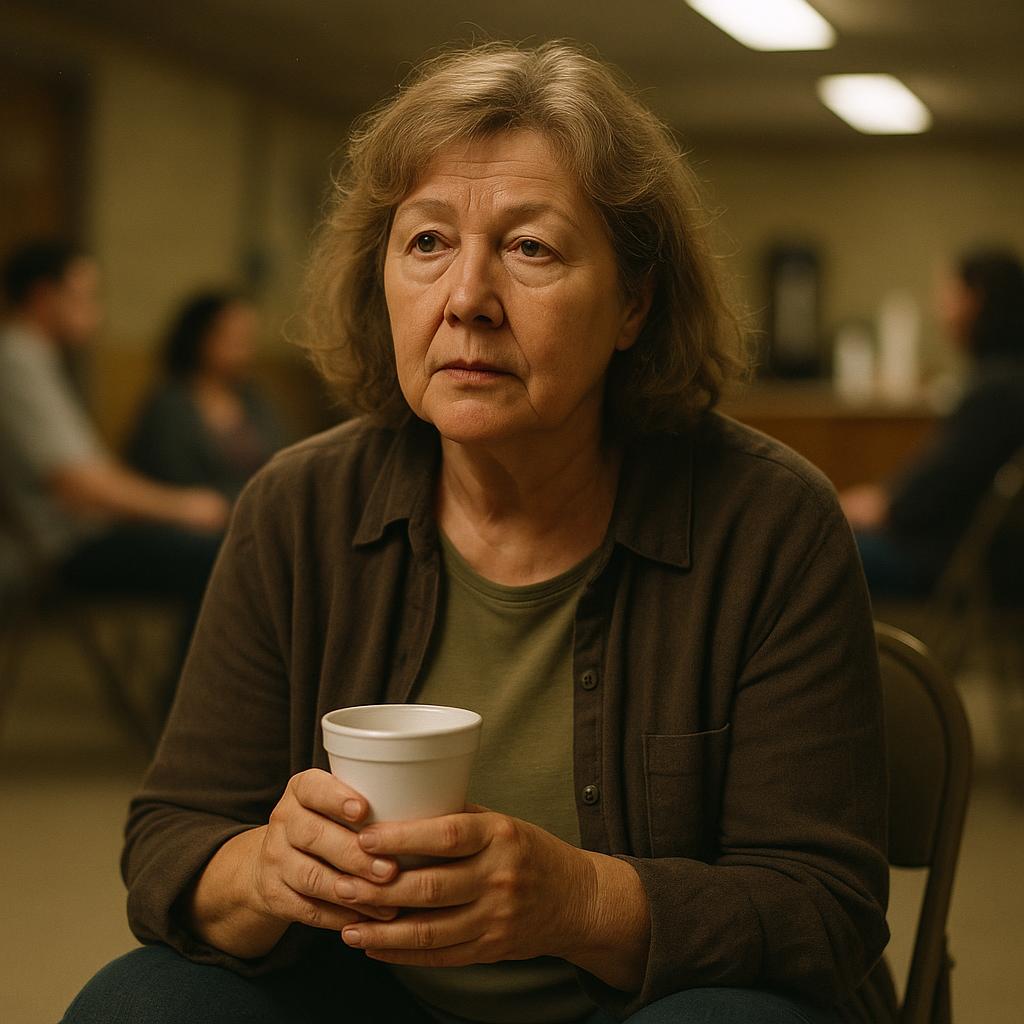 Image by RM AI
Image by RM AI
The Photo Album
Detective Morales had suggested I go through Mark's things again, looking for anything unusual. That's how I found myself in our attic on a sweltering Tuesday afternoon, dust dancing in the sunbeams as I sorted through boxes we'd packed away years ago. Behind an old Christmas tree stand and some forgotten winter coats, I spotted a leather-bound album I'd never seen before. The cover was unmarked, but something about it made my heart race. When I opened it, the first photo knocked the wind out of me. There was Mark, much younger, standing with Pete and three other men I didn't recognize, all grinning in front of a storage facility. 'Unit 147' was visible on a door behind them. My fingers trembled as I turned the pages. More photos, spanning at least fifteen years, showed the same group at different storage facilities across the country. Some had dates and locations scribbled on the back: 'Tucson, 1998,' 'Portland, 2003,' 'Memphis, 2007.' In every picture, they looked so... normal. Just guys on a road trip, not criminals hiding stolen money. I sank to the floor, the album heavy in my lap. This wasn't a one-time mistake or a momentary lapse in judgment. This was systematic. Planned. Repeated. The man who'd held me every night for forty years had been living a double life all along. I pulled out my phone to call Detective Morales, then hesitated. There was something about the last photo that didn't make sense—a woman standing slightly apart from the group, her face partially obscured but hauntingly familiar.
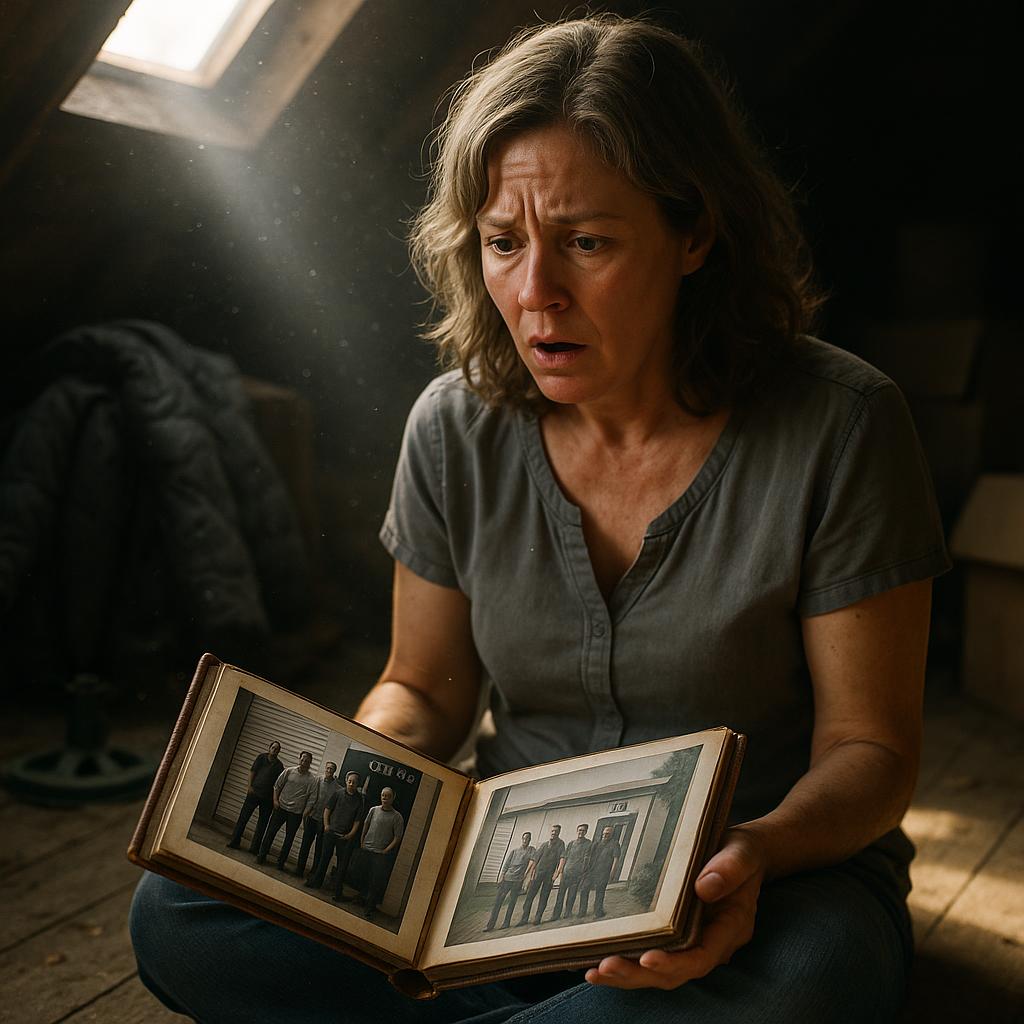 Image by RM AI
Image by RM AI
The Newspaper Article
I was sipping my morning coffee when I saw it—Mark's name splashed across the front page of the Westfield Chronicle. 'LOCAL MAN IMPLICATED IN MULTI-STATE EMBEZZLEMENT SCHEME,' the headline screamed. My hands shook so badly that coffee sloshed onto the kitchen table. There, in black and white, was my husband's life reduced to 'key accomplice' and 'deceased co-conspirator.' The article detailed how retirement funds had been systematically drained from accounts across three states, affecting over two hundred victims. They quoted Detective Morales calling it 'one of the most sophisticated fraud operations we've seen in decades.' I read every word twice, each one like a knife twisting deeper. By noon, my phone was blowing up. First came Barb from my book club, then my dentist's receptionist, then people I barely knew from church. I let every call go to voicemail. What could I possibly say? 'Yes, the man who brought you casseroles when your husband died was apparently stealing old people's life savings on the weekends'? The worst call was from Dorothy—the woman from the support group. She left a message saying she'd seen the article and wanted to talk. Her voice wasn't angry, which somehow made it worse. I sat in my silent kitchen, surrounded by the ruins of the life I thought I had, wondering how many more people from my past would emerge from the shadows, looking for answers I didn't have.
 Image by RM AI
Image by RM AI
Jacob's Offer
The doorbell rang on a rainy Saturday afternoon, and there was Jacob again, standing on my porch with that same awkward smile. This time, he wasn't holding donuts but car keys that dangled from his fingers. 'I've been working on the Mustang,' he said, raindrops clinging to his jacket. 'She's almost finished.' He shifted his weight from one foot to another, looking suddenly nervous. 'I was wondering if maybe... you'd like to see it?' The invitation caught me off guard. That car had been the key that unlocked all this chaos—did I really want to see it again? Jacob must have sensed my hesitation. 'Sometimes,' he said gently, 'we need to revisit the past before we can truly move forward.' His words weren't profound, but they hit me right in the chest. For months, I'd been drowning in Mark's secrets, Pete's crimes, and Lila's betrayal. I'd been so focused on solving the mystery that I hadn't given myself permission to heal. 'I'd like that,' I heard myself say. We made plans for the following week, and as I closed the door behind him, I felt something I hadn't experienced in a long time—a small flutter of anticipation. Not excitement exactly, but a tiny spark of something that felt dangerously like hope. Maybe seeing the Mustang one last time would help me say goodbye not just to the car, but to the weight of everything it had come to represent.
 Image by RM AI
Image by RM AI
Pete's Confession
Detective Morales called me on a Tuesday morning, his voice carrying an unusual hint of optimism. 'Mrs. Thompson, Pete's agreed to a plea deal. He's talking—telling us everything.' I sank into my kitchen chair, gripping the phone tighter. 'Everything?' I whispered. What followed was like watching someone rewrite the past I thought I knew. Pete had confessed to manipulating Mark for years, using our financial struggles as leverage. 'Your husband wasn't a willing participant,' Morales explained gently. 'According to Pete, he threatened to expose Mark's involvement if he ever backed out.' Apparently, Mark had initially loaned Pete money during a rough patch—a completely innocent act—but Pete had used that money for his scheme, then blackmailed Mark into helping hide the evidence. 'He was protecting you,' Morales said. 'Pete threatened to implicate you as well if Mark went to the authorities.' I hung up and stared at our wedding photo on the wall, tears blurring Mark's smiling face. Relief washed over me that he wasn't the criminal mastermind I'd feared, quickly followed by a crushing wave of sadness. Why hadn't he trusted me enough to share this burden? We'd faced everything else together—mortgage problems, Lila's rebellious teenage years, his mother's dementia. Yet he'd carried this secret alone, thinking he was shielding me. I wondered what else he'd sacrificed in silence, believing it was for my protection.
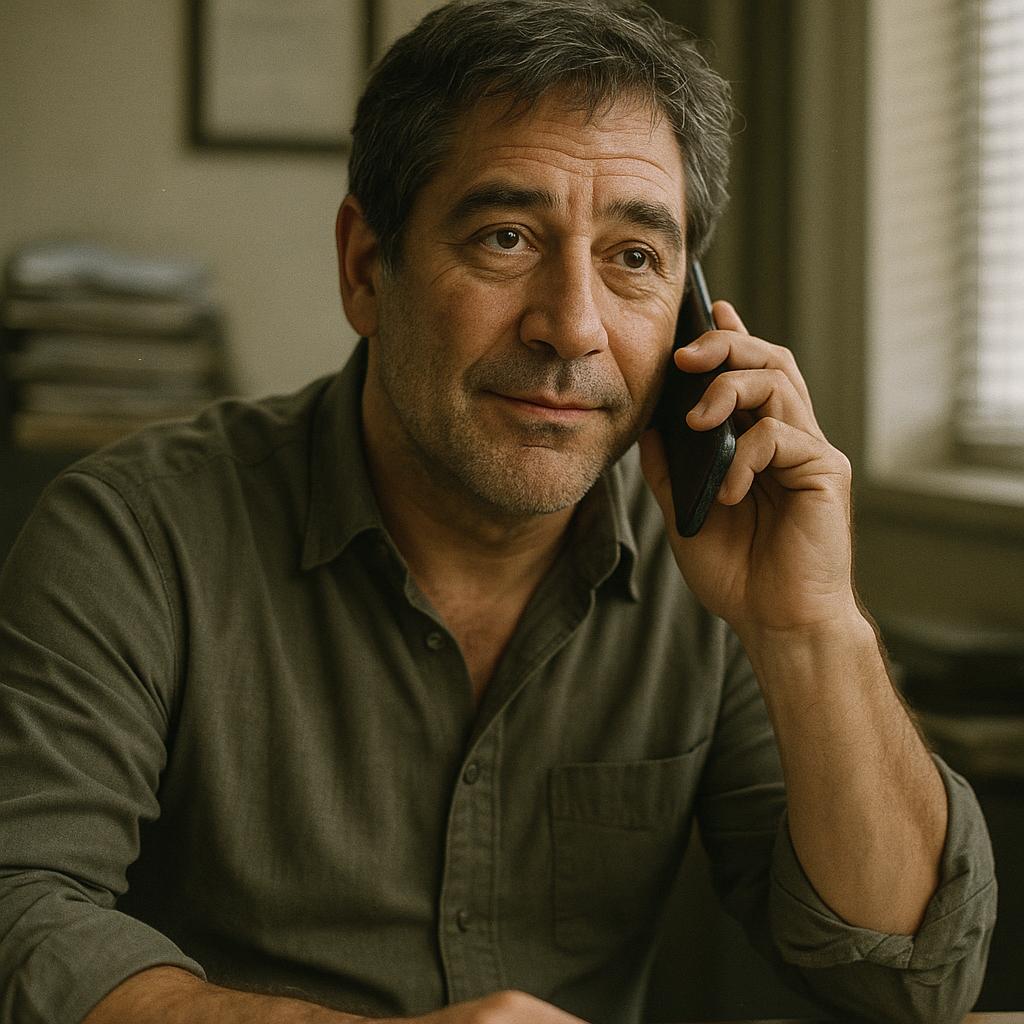 Image by RM AI
Image by RM AI
The Workshop Visit
Jacob's restoration workshop was nothing like I expected—not some grimy garage, but a bright, organized space with tools hanging in perfect rows and the smell of leather cleaner and motor oil mingling in the air. And there it was, Mark's 1968 Mustang convertible, sitting under spotlights like a museum piece. The car gleamed in a way it hadn't in decades, its cherry-red paint job so perfect I could see my reflection. 'I kept all the original features I could,' Jacob explained, running his hand lovingly over the dashboard. 'The steering wheel is the same one Mark gripped. The radio still gets AM stations.' He showed me where he'd carefully restored the leather seats, matching the original grain pattern. I stood there, speechless, remembering how Mark would spend Sunday afternoons tinkering under the hood, whistling off-key. 'Want to take her for a spin?' Jacob asked, dangling the keys. I hesitated. This car had been the key that unlocked so much pain—Pete's crimes, Mark's secrets, Lila's betrayal. But looking at it now, restored to its former glory, I wondered if maybe I could be restored too. 'I haven't driven a stick shift in years,' I admitted. Jacob smiled. 'It's like riding a bike. Your body remembers even when your mind forgets.' As my fingers closed around the keys, I felt something shift inside me—like a rusty part finally breaking loose after years of being stuck.
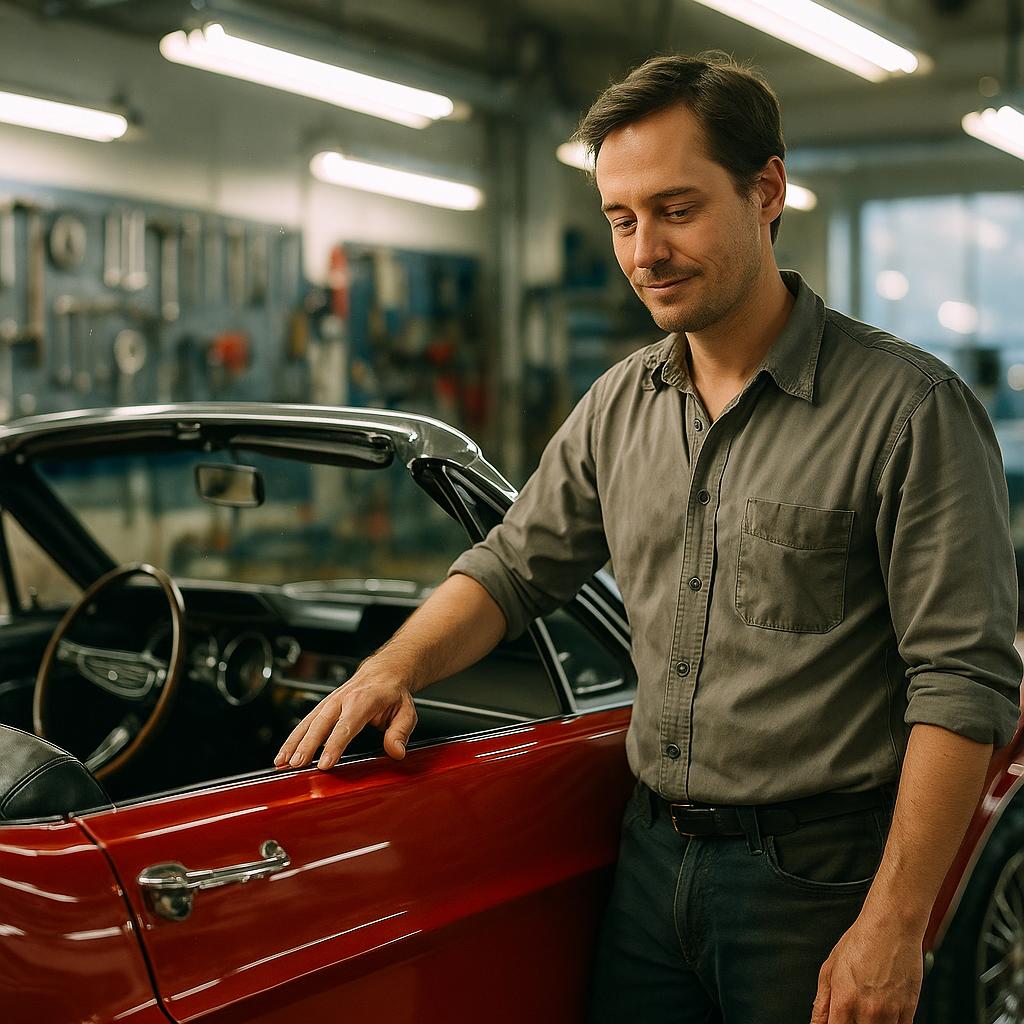 Image by RM AI
Image by RM AI
The Drive
The moment I turned the key in the ignition, the Mustang roared to life with a familiar rumble that vibrated through my bones. 'She still sounds exactly the same,' I whispered, more to myself than to Jacob. My hands gripped the steering wheel—the same one Mark's hands had held countless times—and suddenly I was transported back to summer road trips along the coast, Mark singing off-key to Creedence Clearwater Revival while I laughed and told him he was butchering the lyrics. As we cruised down the coastal highway, I lowered the convertible top, and the wind whipped through my gray hair just like it had through my brown hair decades ago. Jacob sat quietly beside me, occasionally pointing out features he'd restored, but mostly just letting me have this moment. 'You're smiling,' he observed after a while. I realized he was right. For the first time in two years, memories of Mark weren't stabbing me with grief but wrapping around me like a warm blanket. I pulled over at a scenic overlook, the ocean stretching endlessly before us. 'Mark and I had our first kiss right here,' I said, surprising myself with the admission. 'We were arguing about something ridiculous, and he just leaned over and...' I trailed off, feeling tears well up—not tears of pain, but something else. Something that felt dangerously like healing. As I sat there in the driver's seat of this beautiful machine that had unlocked so much pain and now, somehow, was unlocking something else entirely, I wondered if maybe the key to moving forward had been here all along.
 Image by RM AI
Image by RM AI
The Victims Fund
I couldn't sleep after that support group meeting. Dorothy's trembling hands and dignified suffering haunted me. At 3 AM, I found myself at the kitchen table with a legal pad, making a list of everything I owned that had any value. My grandmother's pearls. The diamond earrings Mark gave me for our 30th anniversary. The antique silver tea set collecting dust in the china cabinet. By morning, I had a plan. I called Detective Morales, who connected me with Anita Sharma, a lawyer specializing in victim restitution. 'I want to start a fund,' I told her when we met at her downtown office. 'For the people Pete and... and Mark hurt.' She studied me over her reading glasses. 'You know you're not legally obligated to do this, right?' I nodded, twisting my wedding ring. 'I know. But I need to.' Over the next week, I visited three different jewelers and an antique dealer. Each time I sold something, I felt a weight lifting—not just the burden of ownership, but something deeper. When I handed Anita the cashier's check for $17,842, she smiled. 'It's a good start, Ellen.' We set up the 'New Beginnings Restitution Fund' that afternoon. It wasn't much compared to what had been stolen, but it was something. That night, I called Dorothy. 'I can't undo what happened,' I said when she answered, 'but I'd like to try to help.' Her silence on the other end of the line stretched so long I thought we'd been disconnected. Then she whispered something that made my heart catch: 'Mark would be proud of you.'
 Image by RM AI
Image by RM AI
Lila's Redemption
Lila showed up at my door one Tuesday afternoon with a stack of folders and a determined look in her eyes. 'I want to help with the fund, Mom,' she said, not quite meeting my gaze. I hesitated before stepping aside to let her in. Our relationship had been strained since the trunk incident, but something in her voice sounded different—sincere. Over the next few weeks, she became a fixture at my kitchen table, organizing paperwork and making calls to potential donors. She even contributed her family's vacation fund—money they'd been saving for a trip to Hawaii. 'The kids will understand,' she said when I protested. 'Some things are more important than beaches.' One evening, as we sorted through donation receipts, she suddenly put down her pen and looked at me with tears in her eyes. 'Mom, I'm terrified,' she whispered. 'What if I'm just like Dad? What if keeping secrets is in my DNA?' The vulnerability in her voice broke my heart. I reached across the table and took her hand. 'Your father wasn't a bad man, Lila. He made mistakes trying to protect people he loved.' I squeezed her fingers. 'And the fact that you're even asking that question means you're already different.' She nodded, wiping away tears. 'I don't want my kids to ever look at me the way I looked at Dad when I found out.' As we returned to our paperwork, I realized that in trying to make amends to strangers, we were somehow finding our way back to each other. But I couldn't shake the feeling that there was still something Lila wasn't telling me—something that made her throw herself into this project with such desperate intensity.
 Image by RM AI
Image by RM AI
The Trial Begins
The courtroom felt smaller than it looked on TV—more claustrophobic, with its wood-paneled walls and fluorescent lighting that made everyone look sickly. I smoothed my navy blue blazer (the one Lila insisted made me look 'trustworthy') and tried to steady my breathing as I was sworn in. When I finally looked up, Pete was staring right at me from the defendant's table. The confident, charismatic brother-in-law who'd charmed everyone at family gatherings was gone. In his place sat a hollow-eyed stranger in an ill-fitting suit, his once-thick hair now sparse and gray. Our eyes locked for just a moment before he looked away, shoulders slumping. 'Mrs. Thompson,' the prosecutor began, 'please tell the court how you discovered the evidence in question.' As I recounted finding the key, the storage unit, the trunk of cash—my voice grew steadier with each detail. I described Mark's letters, the photo album, the years of deception. The jury leaned forward, hanging on every word. For two years, I'd been a victim in this story—the clueless widow left to clean up the mess. But sitting there, facing the man who'd manipulated my husband and threatened my daughter, I felt something shift inside me. I wasn't just a witness anymore; I was reclaiming our family's narrative. When the defense attorney rose for cross-examination, his condescending smile didn't intimidate me like it might have months ago. 'Mrs. Thompson,' he drawled, 'isn't it possible your late husband was more involved than you're suggesting?' I leaned toward the microphone, my voice clear and unwavering. 'No, sir. It's not possible. And I have the evidence to prove it.'
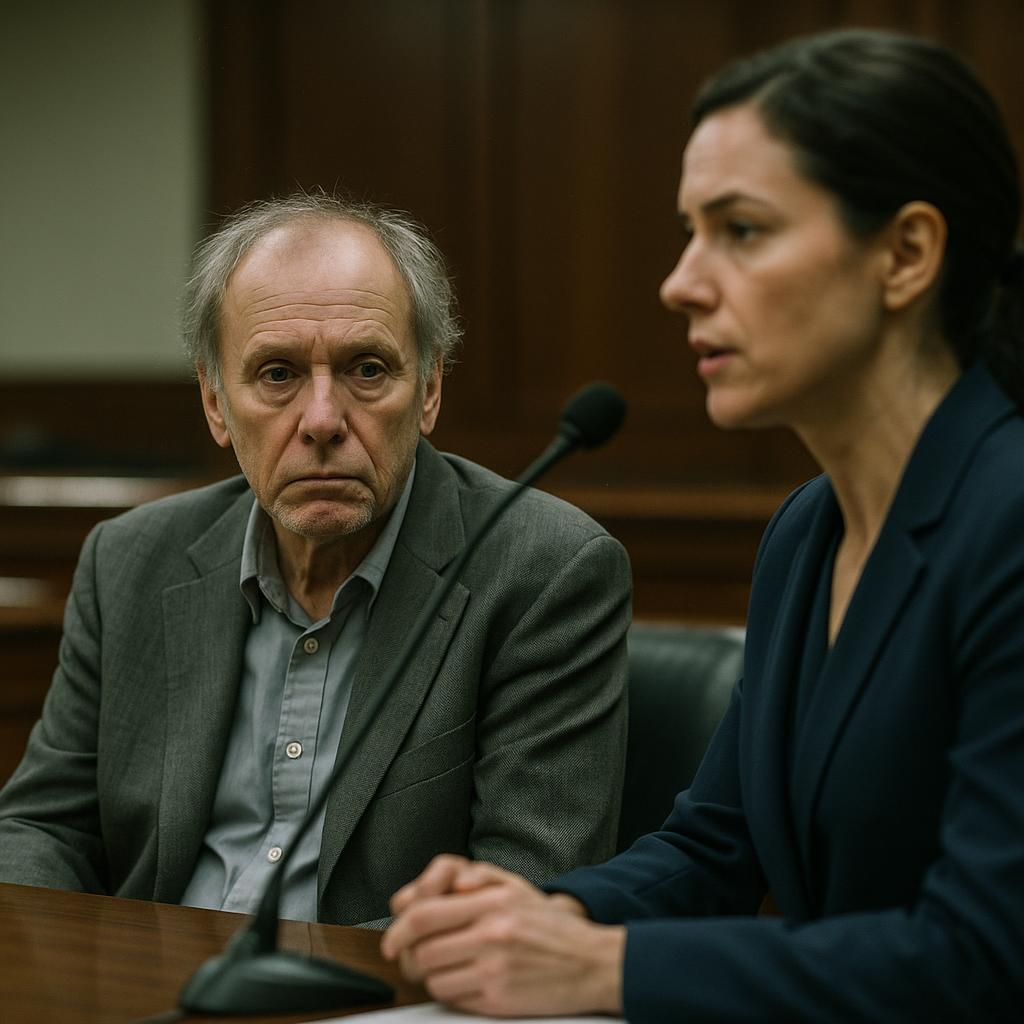 Image by RM AI
Image by RM AI
Martha's Story
Martha called me the night before her testimony, her voice quivering like autumn leaves. 'Ellen, I don't think I can do this alone,' she confessed. 'My hands shake too much to hold the paper.' Without hesitation, I offered to stand beside her. The next morning, as Martha took the stand, I noticed how small she looked against the imposing backdrop of the courtroom. At 78, she carried herself with a quiet dignity that commanded respect despite her fragile frame. When the prosecutor invited her to begin, she nodded at me. I stood and held her carefully typed statement while she spoke, her voice growing stronger with each word. 'I worked as a school librarian for forty-two years,' she told the court. 'I packed my lunch every day. I never took vacations I couldn't afford.' She described how losing her retirement fund had forced her to sell her home of thirty years and move into her son's guest bedroom. 'I now sleep in what used to be my grandchildren's playroom,' she said, her voice cracking slightly. 'I can hear them whispering sometimes, wondering when Grandma will leave.' The courtroom fell silent. Even Pete couldn't look up from the table. When Martha finished, she reached for my hand and squeezed it with surprising strength. 'Thank you for bringing this to light,' she whispered. As we walked out together, I realized something profound—Martha wasn't just a victim in this story. She was its heart. And what I didn't know then was that her testimony would change everything about the case in ways none of us could have predicted.
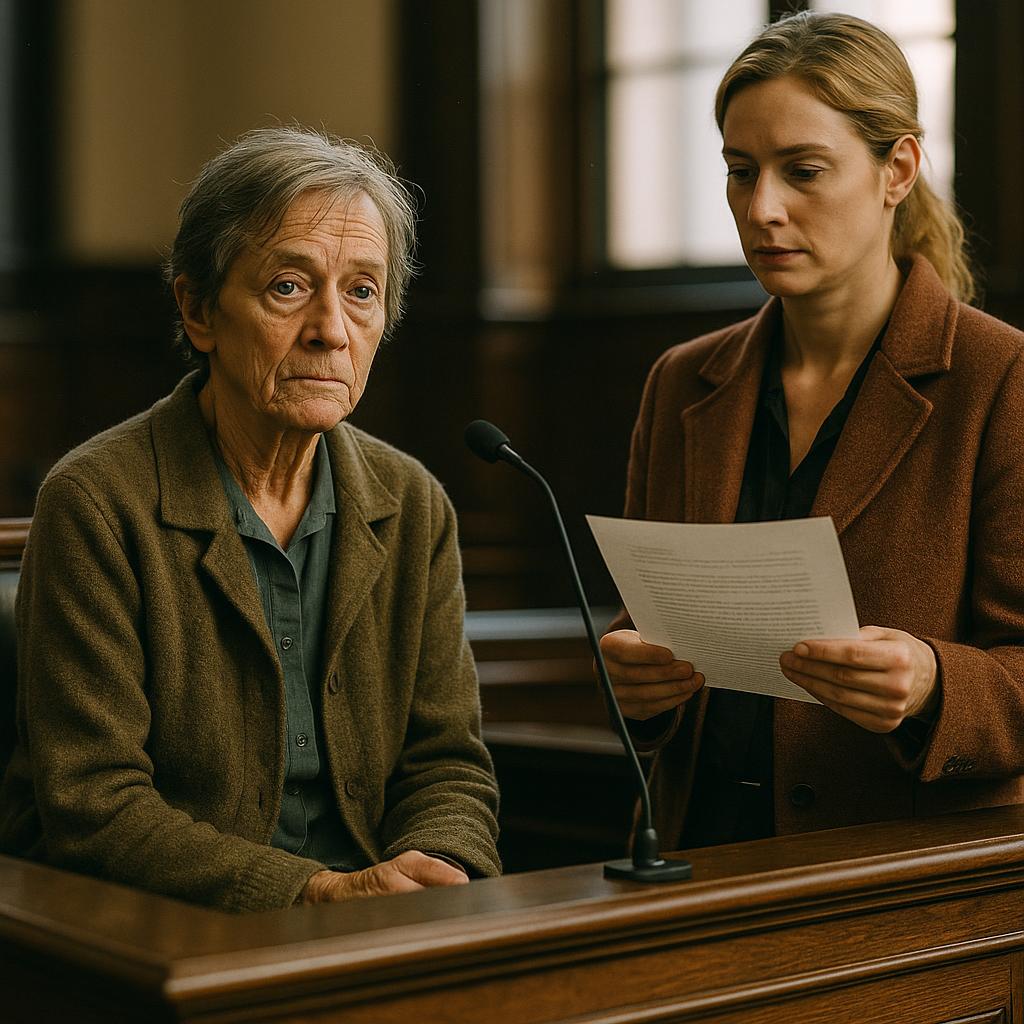 Image by RM AI
Image by RM AI
The Media Attention
I never imagined I'd see my face on the morning news or my name trending on social media. The trial turned our small-town scandal into national headlines overnight. 'WIDOW UNCOVERS LATE HUSBAND'S CRIMINAL PAST' screamed one tabloid, while another went with 'GARAGE SALE REVEALS DECADES OF DECEPTION.' My phone rang constantly with reporters wanting the juicy details—how it felt to discover Mark's betrayal, whether I'd suspected anything. I deleted voicemails without listening and stopped answering unknown numbers. Then came an email from Diane Lawson, a journalist with the Tribune. 'I'm not interested in sensationalizing your pain,' she wrote. 'I want to focus on the victims fund you've created and how communities can heal after financial fraud.' Something about her approach felt different. When we met at a quiet café away from the courthouse, she didn't ask about Mark's secrets or my feelings of betrayal. Instead, she asked about Martha, about Dorothy, about the elderly couple who'd lost their dream retirement home. 'People need to know there's hope after something like this,' she said, recorder placed gently between us. 'They need to know that communities can rebuild.' As I shared the story of the New Beginnings Fund, I realized I wasn't just talking about the victims anymore—I was talking about myself too. What I didn't realize then was how Diane's article would change everything, bringing forward someone from Mark's past who held the final piece of the puzzle.
 Image by RM AI
Image by RM AI
Jacob's Past
Jacob invited me to dinner at a small Italian restaurant downtown—nothing fancy, just a quiet place with checkered tablecloths and candles stuck in wine bottles. I was nervous, not because it felt like a date (though maybe it was), but because I'd spent so long in isolation that normal social interaction felt foreign. Over pasta primavera, our conversation flowed easily until Jacob set down his fork and took a deep breath. 'There's something I need to tell you about why I was so drawn to your story,' he said, his eyes meeting mine. 'My father was involved in a similar scheme when I was a teenager.' He explained how his dad had helped a business partner hide money from investors, resulting in his father serving five years in prison. 'I was sixteen when they took him away,' Jacob said, his voice steady but pained. 'My mom fell apart. We lost everything—our house, our savings, even friends.' I reached across the table and squeezed his hand as he continued. 'That's why I restore old cars. Some things can be fixed, even after they seem beyond repair.' His words hung between us, heavy with meaning. 'Each restoration is like... redemption, I guess. Taking something broken and making it whole again.' The vulnerability in his eyes touched something deep inside me. For the first time, I realized Jacob wasn't just a kind stranger who'd bought Mark's car—he was someone who truly understood what it meant to rebuild a life from the wreckage of someone else's mistakes. What I didn't know then was how much his understanding would matter in the days ahead.
 Image by RM AI
Image by RM AI
The Verdict
The courtroom fell silent as the jury foreman stood. My heart pounded so hard I was sure everyone could hear it. 'On the count of conspiracy to commit fraud, we find the defendant, Peter Thompson... guilty.' The words hung in the air like smoke. I exhaled slowly, feeling Lila's hand tighten around mine. One by one, the guilty verdicts rolled in—embezzlement, tax evasion, witness intimidation. Pete's face remained stone-still, but his shoulders slumped with each pronouncement. When the judge delivered the sentence—eighteen years with no possibility of parole for twelve—murmurs rippled through the courtroom. Martha, sitting two rows ahead, dabbed at her eyes with a tissue. As the bailiff approached to lead Pete away, he turned and our eyes met. His expression wasn't what I expected—not anger or defiance, but something more complex. Regret? Blame? A silent plea for understanding? I couldn't tell. What I did know was that I felt no triumph, no vindication—just a profound weariness and relief that this chapter was finally closing. 'It's over, Mom,' Lila whispered. But as Pete disappeared through the side door, handcuffs glinting under the fluorescent lights, I couldn't shake the feeling that some stories don't end with a verdict. And the letter I found in my mailbox the next morning would prove me right.
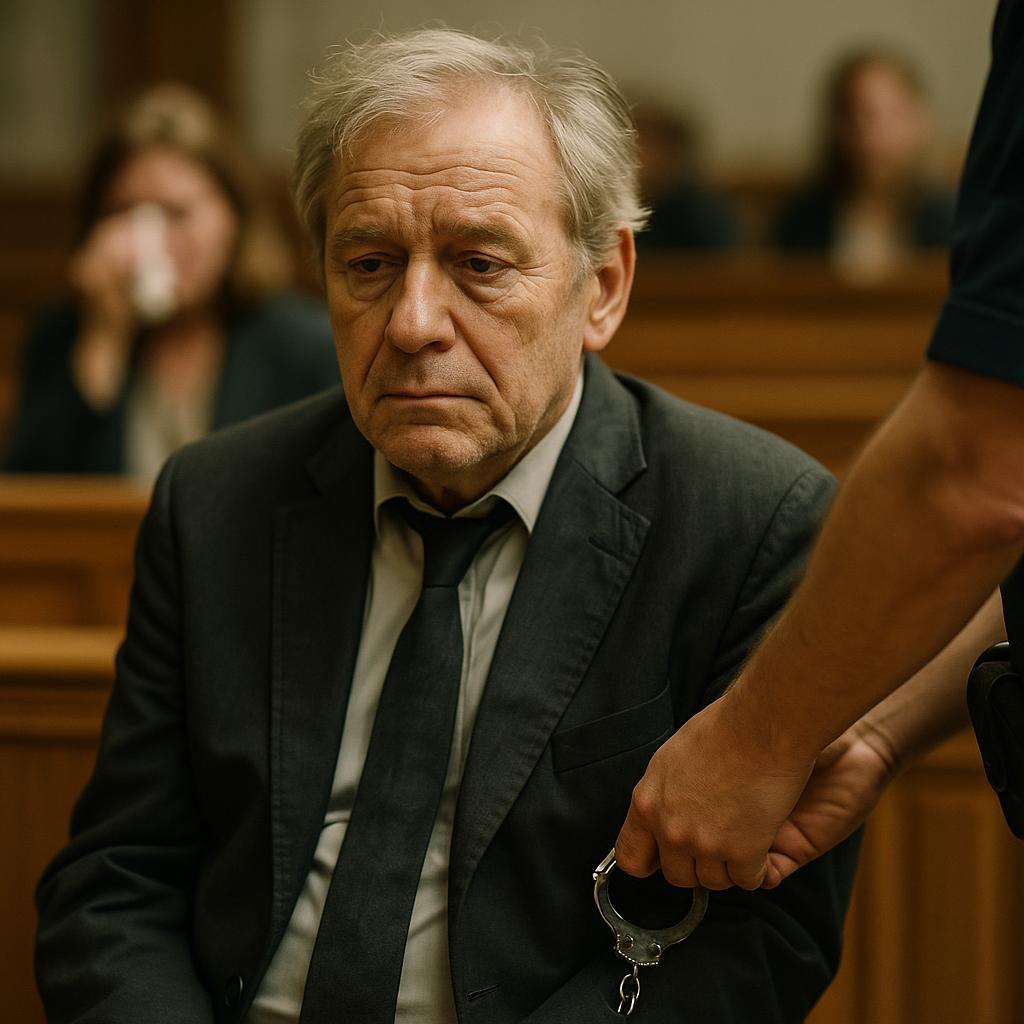 Image by RM AI
Image by RM AI
The House Decision
I stood in the empty living room of a two-bedroom condo, trying to imagine my furniture in this space that was half the size of my current home. 'What do you think?' the realtor asked, her voice echoing slightly against the bare walls. I ran my hand along the kitchen counter—granite, but not the dated brown kind in my house. This was sleek, modern. 'It's... different,' I managed. After the trial, after everything with Pete and the victims fund, the big colonial house Mark and I had shared for thirty-five years felt like both a sanctuary and a prison. The property taxes alone were eating through what little savings I had left, and every creaking floorboard held whispers of our life together. 'You don't have to decide today,' Jacob said gently, standing by the sliding glass doors that led to a small patio. He'd been kind enough to drive me to these viewings, offering a second opinion without pushing. 'Remember what we talked about—sometimes less really is more.' Later that evening, as I walked through my too-big house with its too-many rooms and too-heavy memories, I found myself in Mark's study, a room I'd barely entered since his death. His reading glasses still sat on the desk, as if he might return any moment to finish the mystery novel bookmarked beside them. I picked up a framed photo of us from our thirtieth anniversary trip to Maine. 'What would you do?' I whispered to his smiling face. The house answered with its familiar settling sounds, but for the first time, they didn't comfort me—they reminded me of all the maintenance issues I could no longer ignore. What I didn't realize then was that the decision about the house would be made for me in the most unexpected way.
 Image by RM AI
Image by RM AI
The Unexpected Inheritance
The envelope arrived on a Tuesday, crisp and official-looking with a return address from Pacific Life Insurance. I almost tossed it with the junk mail, assuming it was some sales pitch for seniors. When I finally opened it that evening, I had to sit down, my knees suddenly weak. According to the letter, Mark had taken out a $500,000 life insurance policy seventeen years ago—right around the time he got involved with Pete's scheme. I'd never known about it. My hands trembled as I read the details. The policy had been paid in full, no premiums missed, with me listed as the sole beneficiary. The timing wasn't lost on me. This was Mark's safety net—his way of making sure I'd be okay if everything fell apart. I called the insurance agent the next morning, half-expecting to discover some mistake. But no, everything checked out. The money was real and waiting for me to claim it. That night, I sat at my kitchen table with a glass of wine, staring at the check they'd sent. Five hundred thousand dollars. It would solve everything—the house, retirement, maybe even help expand the victims fund. But something felt wrong about accepting it. Was this blood money? Mark's attempt to buy forgiveness? Or was it his final act of love—trying to protect me even while he was making terrible choices? I couldn't help wondering if accepting this money would make me complicit in some way, or if refusing it would be the final rejection of the man I'd loved for forty years. What troubled me most wasn't the money itself, but the realization that even now, two years after his death, Mark was still revealing himself to me in ways I never could have imagined.
 Image by RM AI
Image by RM AI
The Ethical Dilemma
I sat across from Attorney Novak in her downtown office, the insurance check burning a hole in my purse. 'Ellen, I've reviewed everything,' she said, adjusting her reading glasses. 'This money is legally yours. It has no connection to Pete's scheme.' She leaned forward, her eyes kind but direct. 'Mark wanted to take care of you. This might be the one clean thing he left behind.' I twisted my wedding ring, thinking about the man I thought I knew for forty years. 'But how can I enjoy it knowing what he was involved in?' Novak sighed, closing my file. 'The victims of the fraud aren't your responsibility, Ellen. You're a victim too.' But that didn't sit right with me. That night, I made a pot of tea and sat at my kitchen table with a legal pad, doing calculations until nearly midnight. By morning, I had my answer. I would accept the money—it was Mark's final act of love, however complicated—but I'd commit a substantial portion to expanding the victims fund. Not all of it; I needed to be practical about my own future. But enough to make a difference. Enough to help me sleep at night. When I called Novak to tell her my decision, she was quiet for a moment. 'You know,' she finally said, 'most people wouldn't do that.' I thought about Martha in her son's guest room, about Dorothy's trembling hands. 'I'm not most people,' I replied. What I didn't realize then was that my decision would attract attention from someone who'd been watching the trial unfold from the shadows—someone with their own connection to Mark's past.
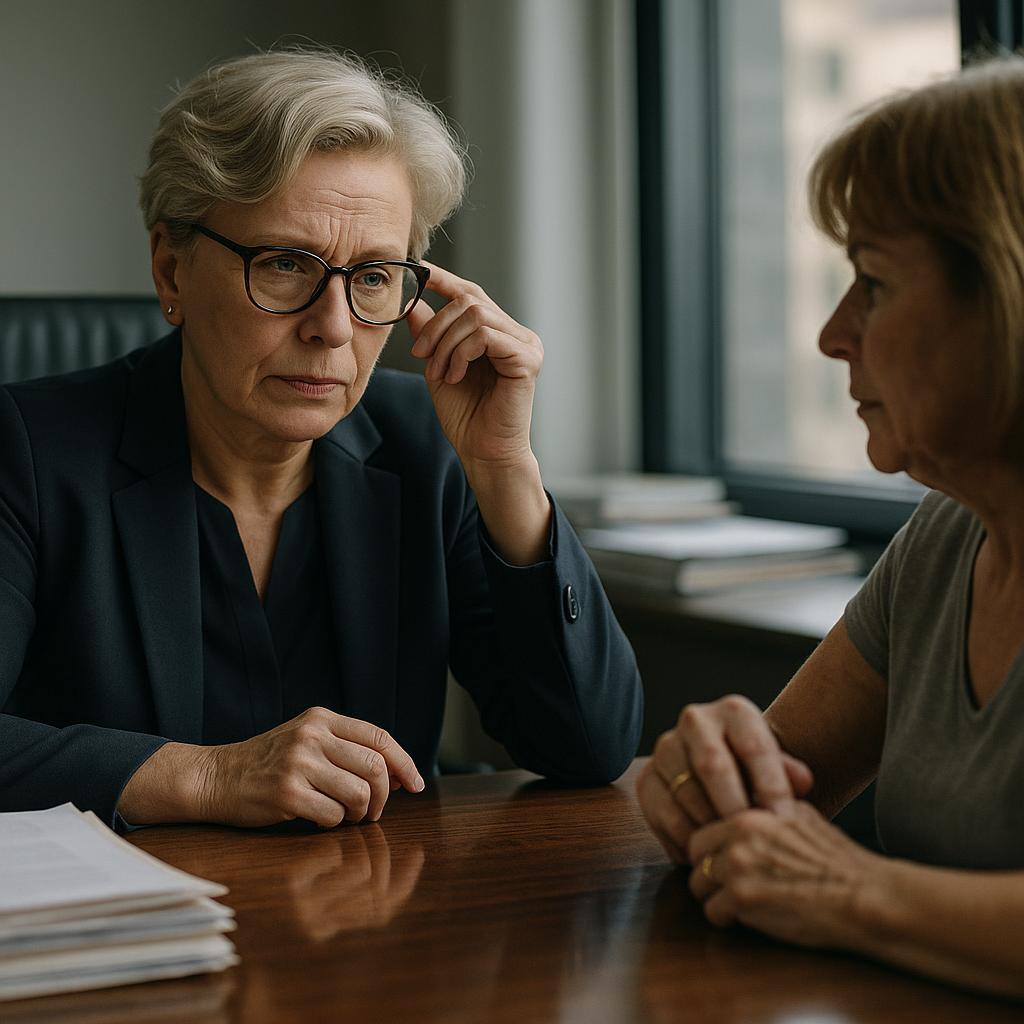 Image by RM AI
Image by RM AI
The New Home
The cottage caught my eye immediately—a small blue Cape Cod with white trim, just three blocks from the ocean. At 63, I never imagined starting over in a new home, but here I was, signing papers across from a realtor half my age. 'Congratulations, Mrs. Thompson,' she beamed, sliding the keys across the table. 'It's all yours.' Walking through the empty rooms afterward, I felt something I hadn't experienced in years: possibility. No ghosts lurked in these corners, no memories of Mark's betrayal or Pete's schemes embedded in the walls. Just 1,200 square feet of fresh paint and hardwood floors waiting for my touch. The garden out back needed work—weeds had claimed most of it—but I could already picture morning coffee on the small patio, listening to distant waves. The single-car garage was perfect too—just enough space for necessities, not enough to hide secrets. That night, sitting on the floor of what would become my bedroom, I called Lila. 'It feels right, Mom,' she said when I described the place. 'A fresh start.' Jacob had said the same thing when he helped me measure for furniture last week. As I watched the sunset paint the empty walls golden, I realized this wasn't just a downsizing—it was a declaration. This house would hold no lies, no hidden keys, no yellowed envelopes with devastating revelations. What I didn't know then was that my peaceful new beginning would be interrupted by a visitor the very next morning—someone who'd traveled a long way to find me.
 Image by RM AI
Image by RM AI
The Moving Day
The morning of moving day arrived with a brilliant sunrise—perhaps a good omen for new beginnings. Lila pulled up in her minivan, kids tumbling out like puppies, eager to help Grandma with the big move. "We've got this organized, Mom," she assured me, clipboard in hand. "The kids are on box duty, I'm handling furniture placement, and Jacob's bringing his truck for the last few heavy items." As we worked through the day, I found myself pausing over each possession, asking the question I'd read in that decluttering book: "Does this bring me joy?" Mark's fishing rods went to Lila's son Tommy, his eyes lighting up as I showed him how his grandfather used to tie flies. "Really, Grandma? I can have them?" The tools—those meticulously organized wrenches and screwdrivers that Mark had spent years collecting—found a new home at the vocational school where Jacob sometimes taught restoration classes. With each item I released, something shifted inside me—a lightness I hadn't felt in years. By sunset, the cottage was taking shape around me, containing only what I truly wanted to carry forward. "You okay, Mom?" Lila asked, finding me standing alone in what would be my new bedroom. I nodded, surprised to realize I wasn't just okay—I was hopeful. What I didn't expect was the small wooden box I'd discover that night while unpacking my nightstand—one I'd never seen before, with a familiar handwriting on the attached note.
 Image by RM AI
Image by RM AI
The Garden Project
The garden became our sanctuary. Jacob arrived one Saturday morning with a truck full of supplies—soil, seedlings, and a hand-drawn layout he'd sketched based on the cottage's southern exposure. "Tomatoes here," he pointed, "and herbs along this edge where you can reach them from the kitchen window." I'd never been much of a gardener—Mark had always handled the yard work—but there was something therapeutic about digging my hands into the earth, creating something new from the neglected patch behind my cottage. Every weekend, Jacob would show up with coffee and donuts, and we'd work side by side, transforming the weedy plot into neat rows of vegetables and flowers. He taught me about companion planting and how to keep the coastal salt spray from damaging tender leaves. "My grandmother swore by marigolds to keep the pests away," he explained, gently placing the bright orange flowers between tomato plants. One particularly warm afternoon, we took a break on the porch, sweaty and dirt-smudged but satisfied with our progress. The garden was taking shape—like my new life. When Jacob's hand tentatively reached for mine, I felt a flutter of panic, then surprise at my own reaction when I didn't pull away. His palm was rough from years of mechanical work, warm against my skin. "Ellen," he said softly, his voice barely audible above the distant ocean waves. I turned to meet his gaze, and the question in his eyes made me realize that perhaps this garden wasn't the only thing beginning to bloom in my new life. What I couldn't have known then was how the simple act of planting seeds would lead to the most unexpected harvest of all.
 Image by RM AI
Image by RM AI
The Anniversary
I woke up this morning knowing exactly what day it was—one year since finding Mark's letter in that old Mustang's glove box. One year since my life turned upside down. I dressed carefully, choosing the blue sweater Mark always liked, and drove to the cemetery with a bouquet of daisies—nothing fancy, just like our marriage had been. The headstone looked smaller somehow, less imposing than it had last time. I placed the flowers against the cool granite and sat on the bench nearby, watching clouds drift overhead. "Well, Mark," I said aloud, not caring if anyone heard me talking to a headstone, "it's been quite a year." I told him about the cottage, the garden, the victims fund—even about Jacob. The words flowed easier than I expected. "I understand better now," I said finally. "Not everything, but enough to make peace with it." On the drive home, I pulled over at our old beach spot—that little cove where we used to bring the kids when they were small. The sun was setting, painting the water in shades of gold and pink that no Instagram filter could ever capture. I kicked off my shoes and let the sand work between my toes, feeling lighter than I had in months. Standing there with the waves lapping at my ankles, I realized something profound: forgiveness isn't about forgetting what happened; it's about not letting it control your future. What I couldn't have known then, as I watched the last sliver of sun disappear beneath the horizon, was that Mark had left one final secret—one that would arrive in tomorrow's mail.
 Image by RM AI
Image by RM AI
The Support Group Leadership
Martha caught me after the victims fund meeting, her eyes bright with purpose. 'Ellen, I need to ask you something important,' she said, guiding me to a quiet corner of the community center. 'I want you to co-lead the support group with me.' I nearly choked on my coffee. 'Me? But I'm not a counselor or—' She squeezed my arm gently. 'You bridge the gap,' she explained. 'You understand both sides—the victims and the families of those who committed the crimes.' I stared at my hands, thinking of Mark's betrayal, of Pete's conviction, of all the lives shattered by their choices. 'I'm not sure I have anything valuable to offer,' I admitted. Martha just smiled knowingly. The next Tuesday, I reluctantly sat beside her at the front of the room, feeling like an impostor. Then Diane walked in—a new face, mid-50s, clutching her purse like a life preserver. When she introduced herself, her voice cracked. 'My husband was arrested last week for investment fraud. I had no idea what he was doing.' The room fell silent. I recognized the shame in her eyes, the disbelief, the fear of judgment. Before I knew it, I was kneeling beside her chair. 'The hardest part,' I said softly, 'is realizing you can love someone deeply and still not know them completely.' Tears spilled down her cheeks as she nodded. 'How do you live with that?' she whispered. As I shared my journey—the shock, the anger, the slow path to acceptance—I realized Martha was right. My pain had purpose now. What I couldn't have anticipated was how this new role would bring someone from Mark's past back into my life—someone who'd been watching me from afar all along.
 Image by RM AI
Image by RM AI
The Book Proposal
The email arrived on a Wednesday morning with a subject line that made me pause: 'Your Story Matters: Book Proposal.' I almost deleted it, assuming it was spam, but something made me click. 'Dear Ellen,' it began, 'My name is Mei Chen from Coastal Press. I've been following the Thompson case and your involvement in the victims fund...' I read it twice, my coffee growing cold beside me. A journalist wanted to write a book about us—about Mark's deception, Pete's crimes, and how the ripples had affected dozens of lives. She emphasized the 'human element' and 'healing journey.' My first instinct was absolute refusal. Haven't we been exposed enough? I thought of Martha, of Dorothy's trembling hands, of Diane's tears at the support group. When Chen called the next day, I was prepared to politely decline. 'Mrs. Thompson,' she said, her voice warm but professional, 'I understand your hesitation. But consider this—how many others are out there right now, discovering their spouse's secrets, feeling alone in their shame?' I found myself silent, remembering my own desperate Google searches in those early days. 'Your story could be the lifeline someone else needs,' she continued. 'The book I envision isn't about sensationalizing fraud—it's about what happens after the headlines fade.' By the end of our hour-long conversation, I was wavering. When she mentioned donating a portion of proceeds to the victims fund, I agreed to meet her in person. What I didn't realize then was that Chen had uncovered something about Mark's past that even I didn't know—something that would change everything I thought I understood about our marriage.
 Image by RM AI
Image by RM AI
Jacob's Question
I was in the garden when Jacob asked me, his hands covered in soil from helping me plant the new rosebushes. 'Ellen,' he said, his voice steady but with a hint of nervousness I'd never heard before, 'I know there's an age gap, but I've never met anyone who understands me like you do.' He paused, wiping his brow with his forearm. 'Would you consider dating me? Officially?' The question hung in the air between us like the scent of fresh earth and flowers. At 63, I never expected to be having this conversation again. Dating? Me? The word itself felt foreign on my tongue. Jacob was only 47—younger, yes, but not drastically so. Still, it wasn't the age that gave me pause. It was Mark. It was the past two years of grief, betrayal, and rebuilding. 'I need some time,' I finally said, my voice softer than I intended. 'This is... unexpected.' Jacob nodded immediately, reaching over to squeeze my hand. 'Take all the time you need. I'm not going anywhere.' That night, as I watered the new plants on my patio, I found myself smiling at the memory of his nervous expression. For the first time in years, I felt that flutter of possibility—that maybe life still had chapters I hadn't anticipated. What surprised me most wasn't Jacob's question, but my own reaction to it: not panic or guilt, but a quiet, persistent hope. What I couldn't have known then was that my answer would be tested in ways neither of us could have imagined.
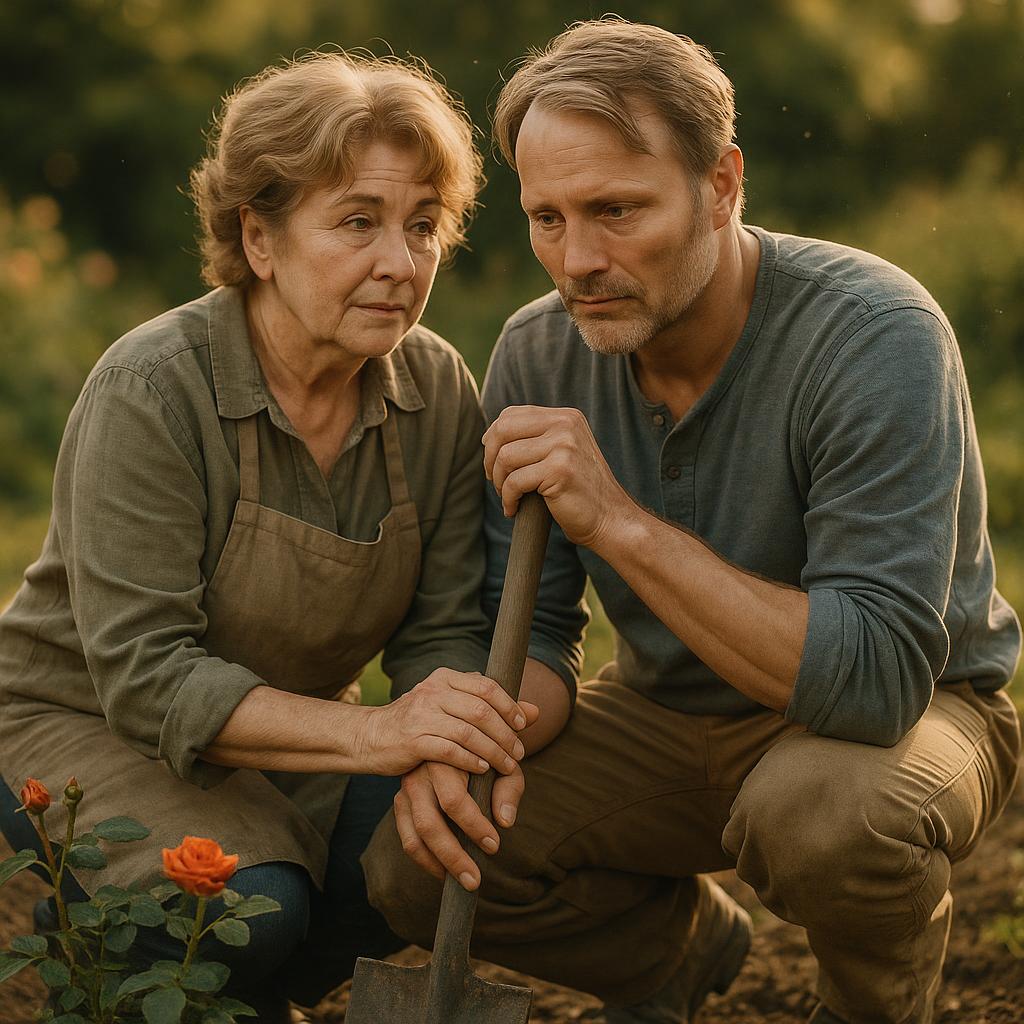 Image by RM AI
Image by RM AI
The Victims Fund Success
The community center buzzed with quiet conversation as I stood near the refreshment table, watching people mingle. Some faces I recognized from our support group meetings—Dorothy with her now-steady hands pouring coffee, Diane chatting with another newcomer. It had been eighteen months since we'd launched the victims fund, and tonight we were celebrating helping our fiftieth family. Fifty families who'd lost everything to Pete and Mark's scheme, now finding their footing again. Martha clinked her glass for attention, and the room quieted. "We have someone special to recognize tonight," she announced, her eyes finding mine. I shook my head slightly, but she was already walking toward me with a wooden plaque. "Ellen Thompson saw beyond her own pain," Martha said to the crowd. "From tragedy, she created something beautiful." As she pressed the plaque into my hands—engraved with words that blurred through my tears—I felt Jacob's reassuring presence beside me. Looking around at these people whose lives had been shattered then slowly rebuilt, I realized I'd found something I never expected: purpose. Not just a reason to get up each morning, but a way to transform Mark's betrayal into something healing. "Would you like to say a few words?" Martha whispered. As I stepped forward, clutching the plaque to my chest, I noticed a man at the back of the room I didn't recognize—watching me with an intensity that sent a chill down my spine.
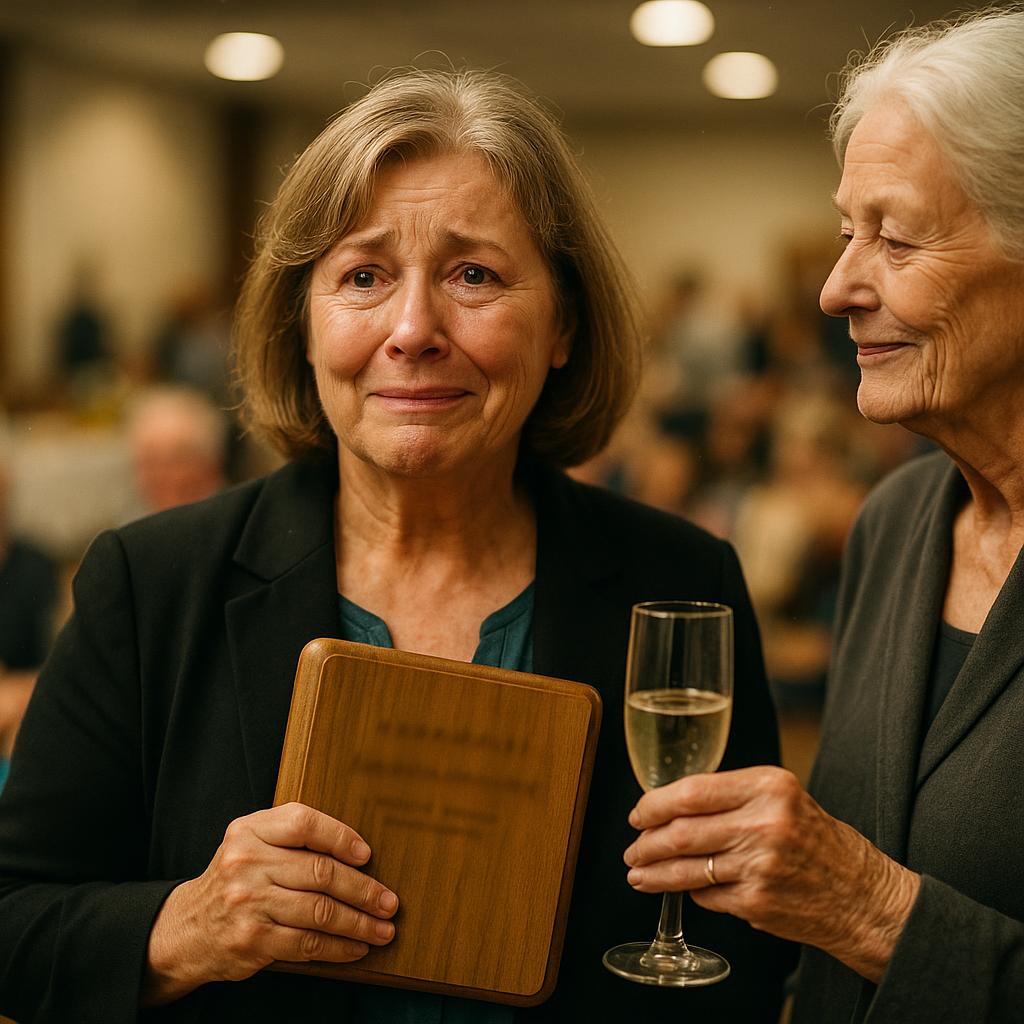 Image by RM AI
Image by RM AI
Pete's Letter
The envelope arrived on a Tuesday, just like so many life-changing things seem to. Plain white, prison postmark, with handwriting I didn't recognize but somehow knew immediately. Pete. My hands trembled as I carried it to my garden bench, the roses Jacob and I had planted now in full bloom around me. For several minutes, I just stared at it, wondering if I should throw it away unopened. But curiosity—that same force that had led me to the storage unit and into Mark's secrets—won out again. 'Dear Ellen,' it began, the handwriting neat but cramped, as if conserving the prison-issued paper. 'I know I have no right to contact you...' What followed was four pages of confession and remorse. Pete described how he'd manipulated Mark, playing on their brotherhood, on family loyalty. 'Mark tried to back out several times,' he wrote, 'but I always pulled him back in. I threatened to expose him, to ruin your reputation too.' I read it twice, tears blurring the words the second time through. Not because I felt sorry for Pete—I didn't—but because it confirmed what I'd come to believe: Mark had been weak, not evil. He'd made terrible choices, but he'd been caught in something that spiraled beyond his control. I folded the letter carefully and placed it in my keepsake box—not as a treasured memory, but as a reminder of how easily good people can be led astray when they compromise just once. I decided not to respond. Some doors are better left closed. What I couldn't have known then was that Pete's letter wasn't the only correspondence I'd receive that week—and the next one would upend everything I thought I knew about Mark's final days.
 Image by RM AI
Image by RM AI
The Book Launch
The bookstore was packed wall-to-wall, faces I recognized mingled with strangers who'd been touched by our story. Chen's book, 'The Glove Box Secret: Truth, Betrayal, and Redemption,' sat prominently displayed at the entrance, my own face staring back at me from the cover photo. 'Five minutes, Mrs. Thompson,' the event coordinator whispered, touching my elbow gently. My stomach churned. Public speaking had never been my thing—Mark had always been the charmer at parties while I preferred quiet conversations in the corner. Jacob squeezed my hand reassuringly. 'You've got this,' he murmured. When I finally took the podium, the room fell silent. My prepared notes trembled in my hands, but as I began speaking about Mark, about Pete, about the victims fund, something shifted. The words flowed naturally, as if I'd been waiting to tell this story my whole life. Afterward, a line formed for book signings. That's when she approached—a woman about Lila's age, clutching the book to her chest like armor. 'Mrs. Thompson,' she said, voice breaking, 'my father did what your husband did. For years, I couldn't forgive him.' Tears welled in her eyes. 'I never understood until I read your story. How someone good could make such terrible choices.' She reached for my hand. 'Thank you for being brave enough to share this.' Walking to the car later, Jacob's arm around my shoulders, I realized that exposing our painful truth hadn't just helped me heal—it had created ripples I never anticipated. What I couldn't have known then was that among the crowd that night was someone who'd been searching for me for a very long time—someone with their own connection to Mark's past that would soon come knocking at my door.
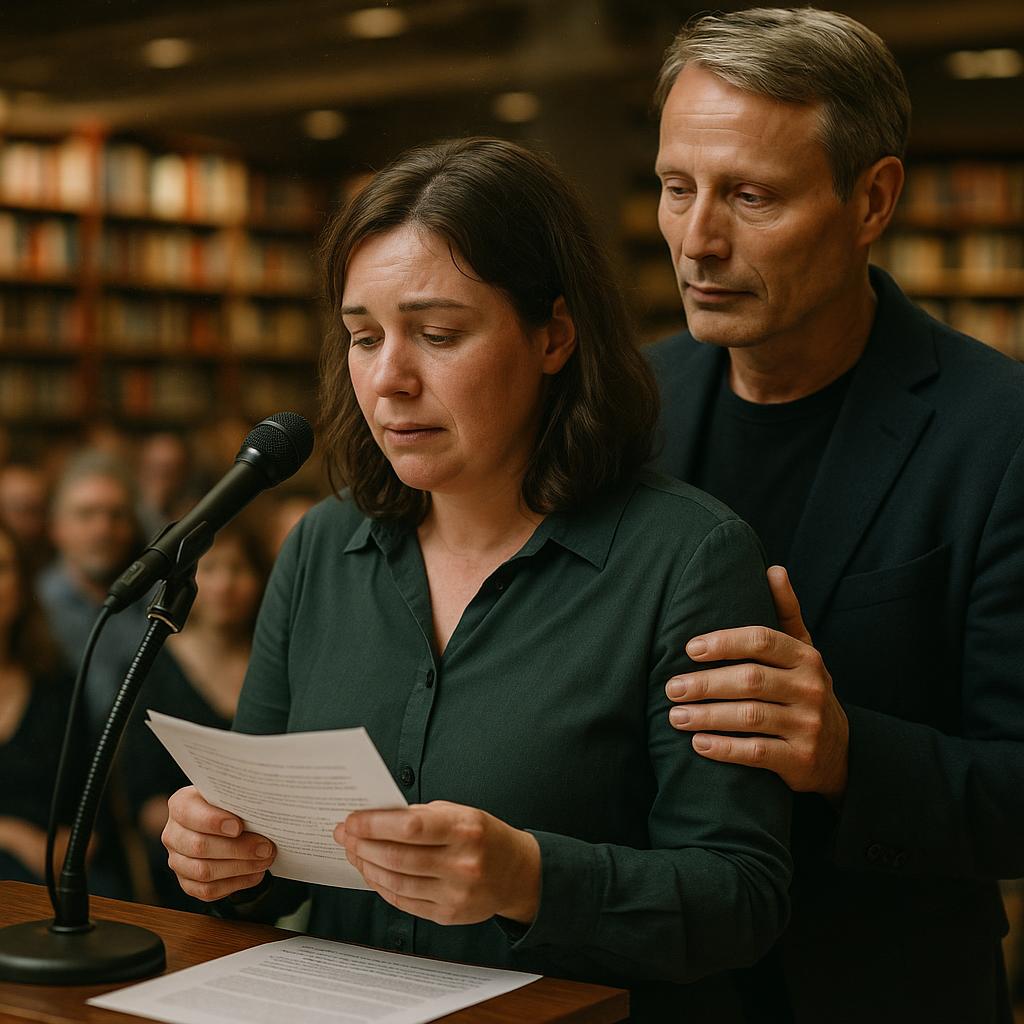 Image by RM AI
Image by RM AI
The Answer
I spent all afternoon preparing Jacob's favorite meal—grilled salmon with roasted vegetables and that lemon butter sauce he always raves about. My hands trembled slightly as I lit the candles, wondering if I was making the right decision at 63. When the doorbell rang, I smoothed my dress and took a deep breath. Jacob stood there with wildflowers from my garden, looking as nervous as I felt. 'These seemed appropriate,' he said with that crooked smile that had become so dear to me. Over dinner, we talked about everything and nothing, the conversation flowing as easily as the wine. Finally, as we moved to the porch swing with coffee, I took his hand. 'I've been thinking about your question,' I said, my voice steadier than I expected. 'I'd like to try this—us—but I need one condition.' Jacob nodded, his eyes never leaving mine. 'Complete honesty between us, always,' I continued. 'No secrets, no matter how painful the truth might be. I've lived through what secrets can do to a marriage.' Something flickered across his face—understanding, perhaps, or recognition of what this meant coming from me. He squeezed my hand and leaned closer. 'Ellen, I promise you an open book, from this day forward.' As he sealed his promise with a gentle kiss, I felt something I thought had died with Mark's betrayal: trust. What I couldn't have known then was that Jacob's promise would be tested sooner than either of us expected.
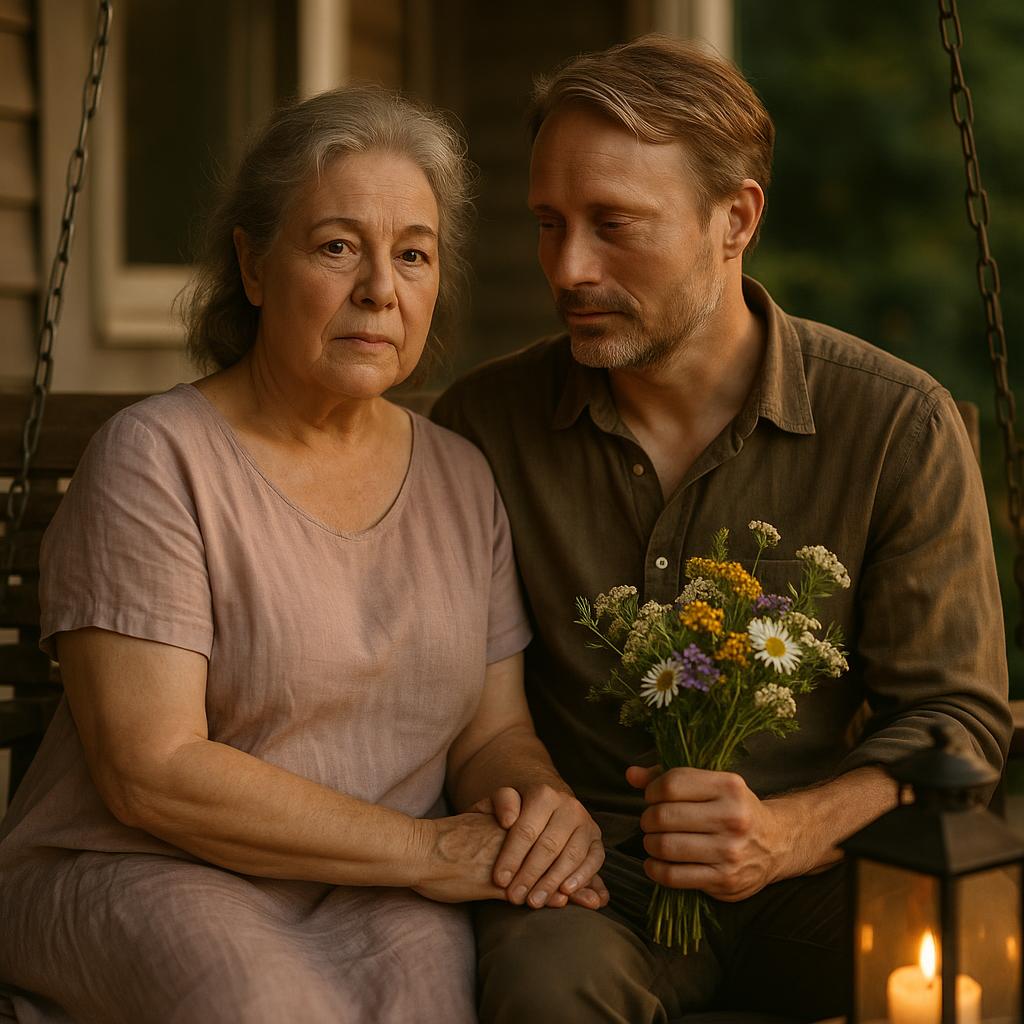 Image by RM AI
Image by RM AI
The Mustang Ride
I never expected to see that Mustang again. But there it was, gleaming in the morning sun outside my cottage, Jacob leaning against it with a grin that made my heart skip. 'Just for the weekend,' he said, dangling the keys. 'Happy anniversary.' One year to the day since I'd sold Mark's prized possession—since I'd found that letter that changed everything. The car looked better than ever, lovingly restored to its former glory. 'You didn't buy it back, did you?' I asked, running my hand along the familiar curves of the hood. Jacob shook his head. 'Just borrowed it from my client. He was happy to oblige when I told him the story.' That afternoon, we drove with the top down along the coastal highway, wind whipping through my hair in a way that made me feel decades younger. As we rounded each curve, memories of Mark surfaced—not the painful ones of betrayal and secrets, but the good ones. His laugh when we'd take Sunday drives. The way he'd sing off-key to the radio. The picnics we'd have at lookout points just like the one where Jacob eventually pulled over. Watching the sunset paint the ocean gold and crimson, I realized something profound: letting go doesn't mean erasing someone from your heart. It means making room for the joy alongside the pain, for the future alongside the past. What I couldn't have known then, as Jacob reached for my hand across the leather seats, was that this wouldn't be the last time the Mustang would play a pivotal role in our story.
 Image by RM AI
Image by RM AI
KEEP ON READING
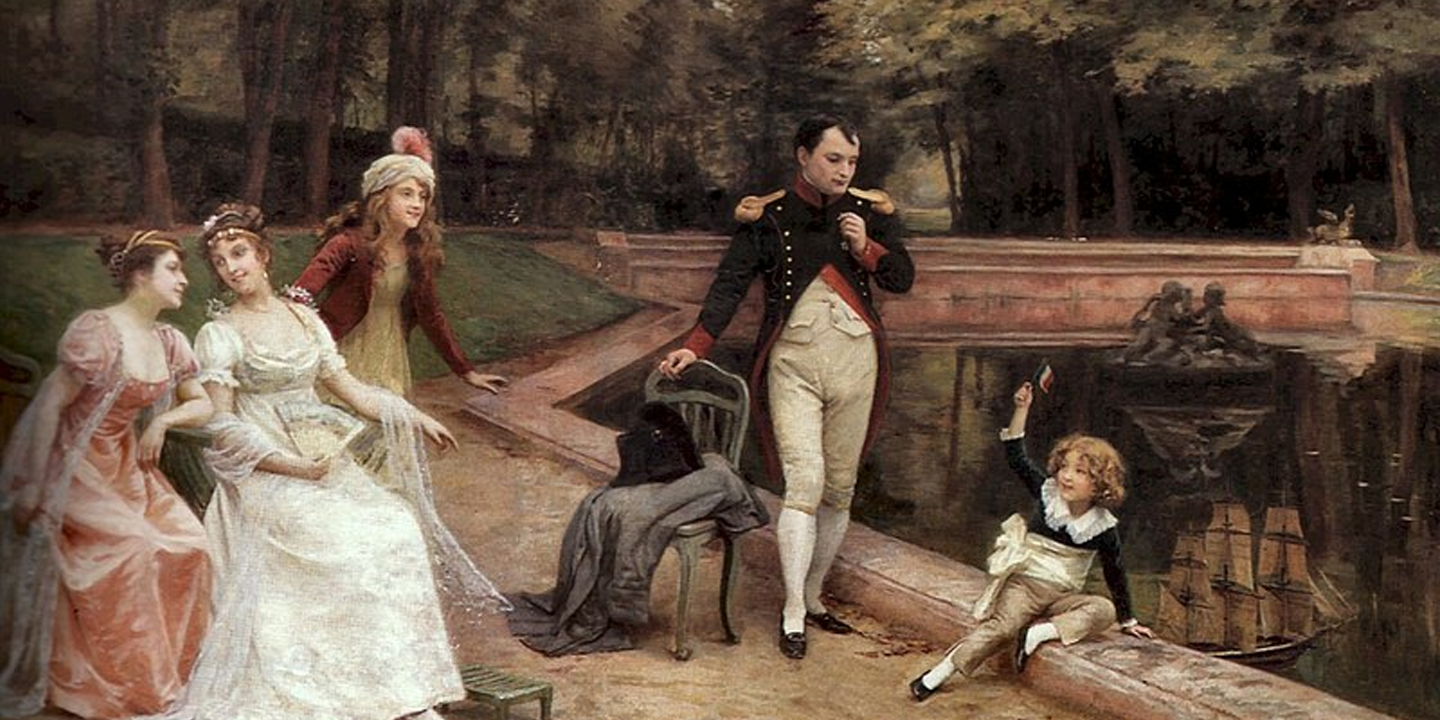
The 20 Most Recognized Historical Figures Of All Time
The Biggest Names In History. Although the Earth has been…
By Cathy Liu Oct 4, 2024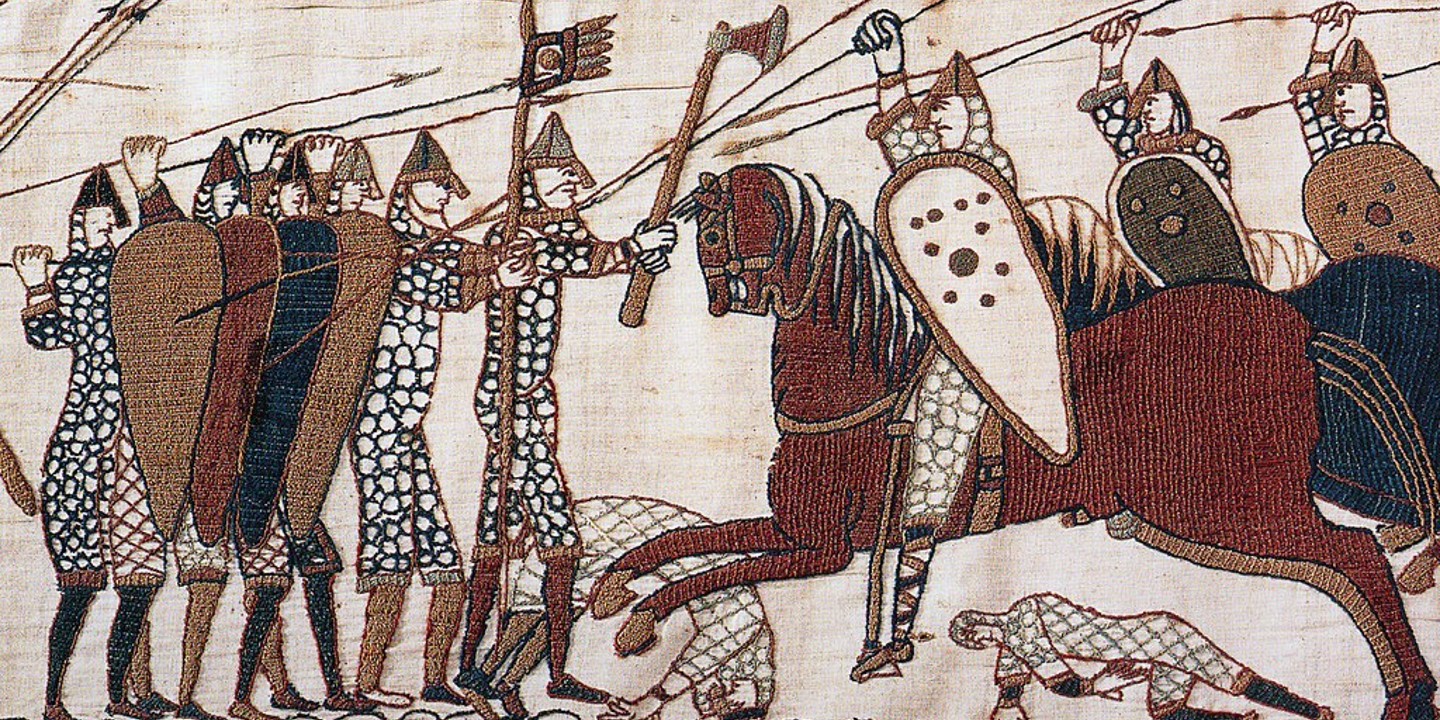
10 of the Shortest Wars in History & 10 of…
Wars: Longest and Shortest. Throughout history, wars have varied dramatically…
By Emilie Richardson-Dupuis Oct 7, 2024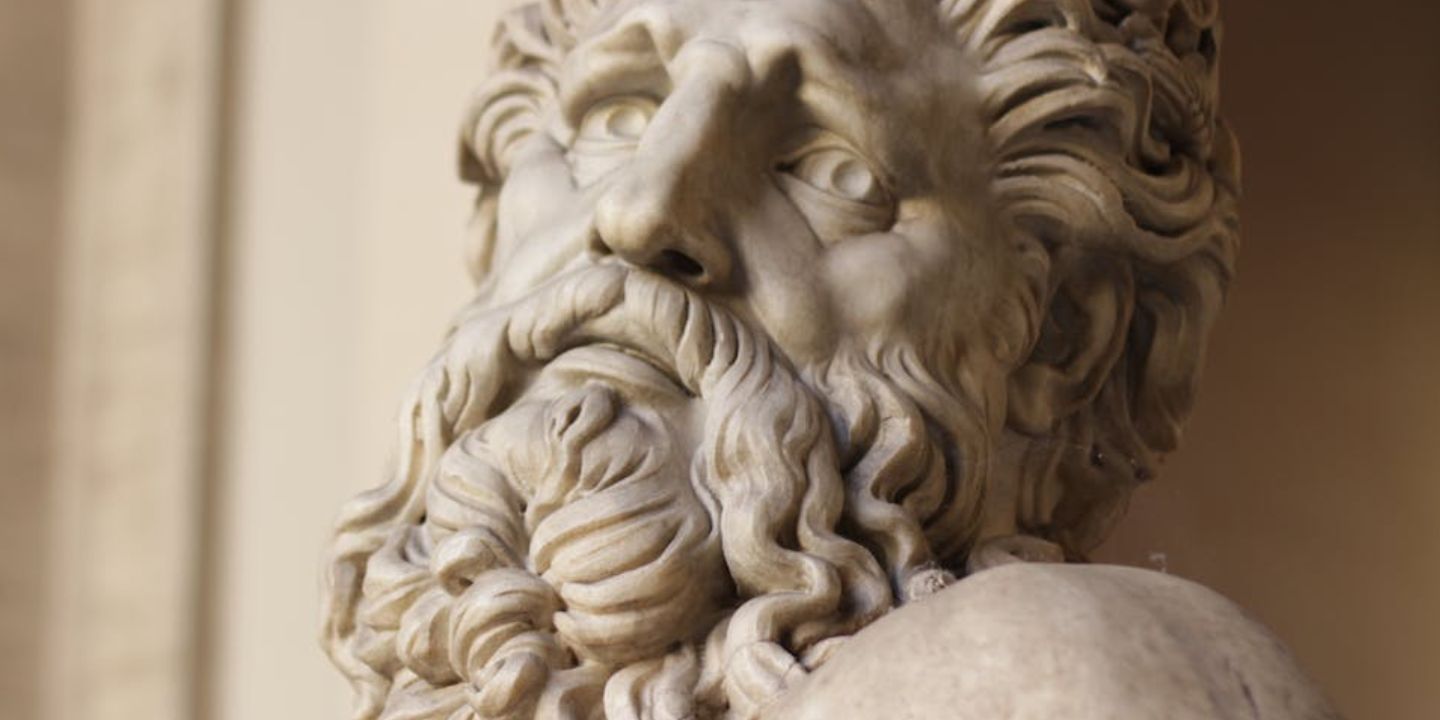
10 Fascinating Facts About Ancient Greece You Can Appreciate &…
Once Upon A Time Lived Some Ancient Weirdos.... Greece is…
By Megan Wickens Oct 7, 2024
20 Lesser-Known Facts About Christopher Columbus You Don't Learn In…
In 1492, He Sailed The Ocean Blue. Christopher Columbus is…
By Emilie Richardson-Dupuis Oct 9, 2024
20 Historical Landmarks That Have The Craziest Conspiracy Theories
Unsolved Mysteries Of Ancient Places . When there's not enough evidence…
By Megan Wickens Oct 9, 2024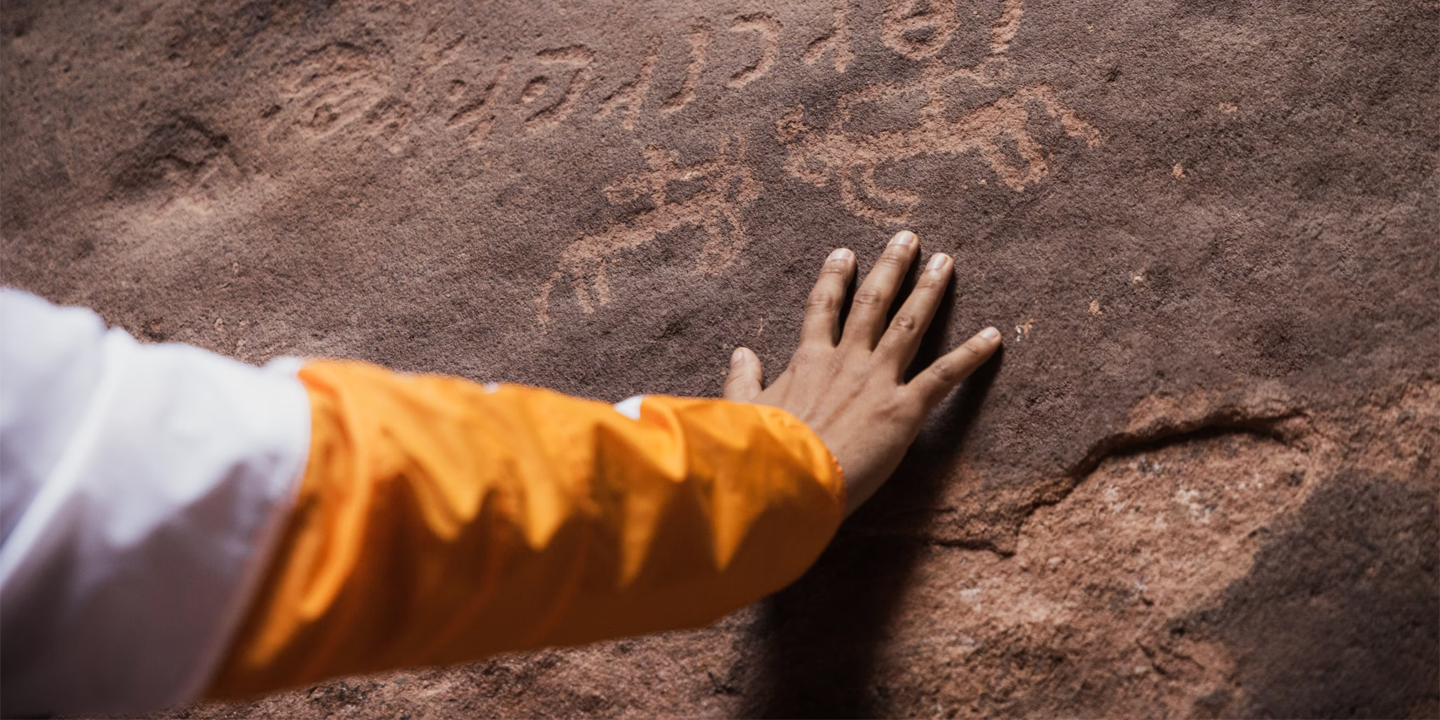
The 20 Craziest Inventions & Discoveries Made During Ancient Times
Crazy Ancient Inventions . While we're busy making big advancements in…
By Cathy Liu Oct 9, 2024
